FIND YOUR SCHOOL
Degree program, areas of focus, tuition range.
Continue to School Search
- Where to Study
- What to Know
- Your Journey


2020 Student Thesis Showcase - Part I
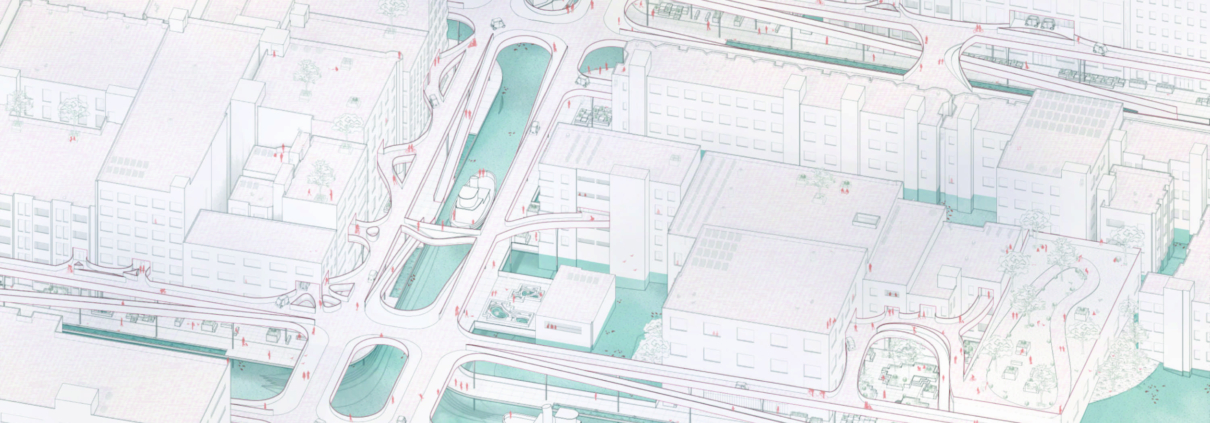
Have you ever wondered what students design in architecture school? A few years ago, we started an Instagram account called IMADETHAT_ to curate student work from across North America. Now, we have nearly 3,000 projects featured for you to view. In this series, we are featuring thesis projects of recent graduates to give you a glimpse into what architecture students create while in school. Each week, for the rest of the summer, we will be curating five projects that highlight unique aspects of design. In this week’s group, the research ranges from urban scale designs focused on climate change to a proposal for a new type of collective housing and so much in between. Check back each week for new projects.
In the meantime, Archinect has also created a series featuring the work of 2020 graduates in architecture and design programs. Check out the full list, here .
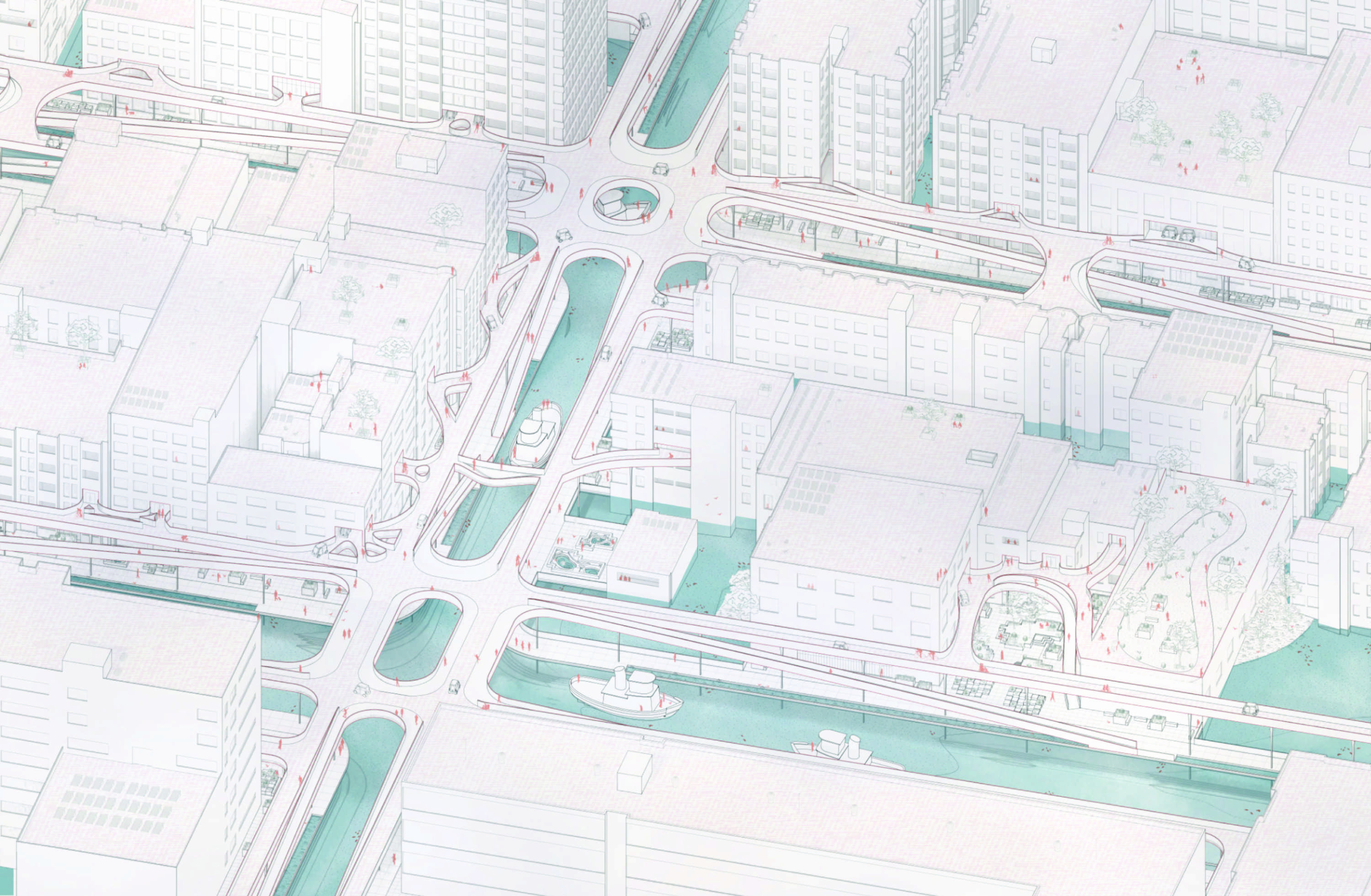
Redefining the Gradient by Kate Katz and Ryan Shaaban, Tulane University, M.Arch ‘20
Thesis Advisors: Cordula Roser Gray and Ammar Eloueini / Course: 01-SP20-Thesis Studio
Sea level rise has become a major concern for coastal cities due to the economic and cultural importance tied to their proximity to water. These cities have sustained their livelihood in low-lying elevations through the process of filling, bridging, and raising land over coastal ecosystems, replacing their ecological value with infrastructures focused on defining the edge between city and nature. Hard infrastructures have been employed to maintain urban landscapes but have minimal capacity for both human and non-human engagement due to their monofunctional applications focused on separating conditions rather than integrating them. They produce short-term gains with long-term consequences, replacing and restricting ecosystems and acting as physical barriers in a context defined by seasonal transition.
To address the issues of hard infrastructure and sea level rise, this thesis proposes an alternative design strategy that incorporates the dynamic water system into the urban grid network. San Francisco was chosen as the location of study as it is a peninsula where a majority of the predicted inundation occurs on the eastern bayside. In this estuary, there were over 500 acres of ecologically rich tidal marshlands that were filled in during the late 1800s. To protect these new lands, the Embarcadero Sea Wall was built in 1916 and is now in a state of neglect. The city has set aside $5 billion for repairs but, instead of pouring more money into a broken system, we propose an investment in new multi-functional ecologically-responsive strategies.
As sea levels rise, the city will be inundated with water, creating the opportunity to develop a new circulation system that maintains accessibility throughout areas located in the flood zone. In this proposal, we’ve designed a connective network where instance moments become moments of pause and relief to enjoy the new cityscape in a dynamic maritime district.
On the lower level, paths widen to become plazas while on the upper level, they become breakout destinations which can connect to certain occupiable rooftops that are given to the public realm. The bases of carved canals become seeding grounds for plants and aquatic life as the water level rises over time. Buildings can protect high-risk floors through floodproofing and structural encasement combined with adaptive floorplates to maintain the use of lower levels. The floating walkway is composed of modular units that are buoyant, allowing the pedestrian paths to conform and fluctuate with diurnal tidal changes. The composition of the units creates street furniture and apertures to engage with the ecologies below while enabling a once restricted landscape of wetlands to take place within the city.
The new vision of the public realm in this waterfront district hopes to shine an optimistic light on how we can live with nature once again as we deal with the consequences of climate change.
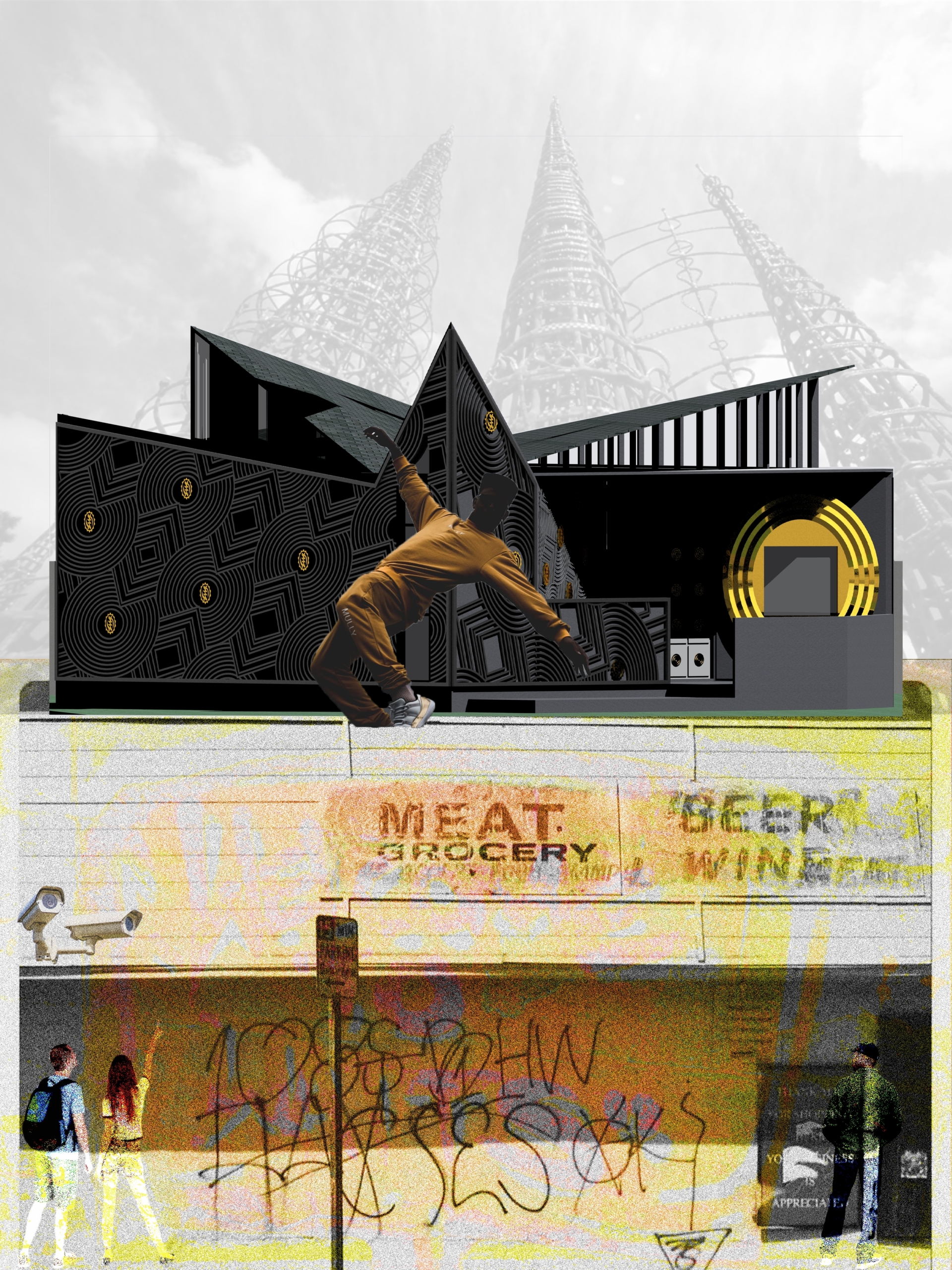
Unearthing the Black Aesthetic by Demar Matthews, Woodbury University, M.Arch ‘20
Advisor: Ryan Tyler Martinez Featured on Archinect
“Unearthing The Black Aesthetic” highlights South Central Los Angeles’s (or Black Los Angeles’s) unique positioning as a dynamic hub of Black culture and creativity. South Central is the densest population of African Americans west of the Mississippi. While every historically Black neighborhood in Los Angeles has experienced displacement, the neighborhood of Watts was hit particularly hard. As more and more Black Angelenos are forced for one reason or another to relocate, we are losing our history and connection to Los Angeles.
As a way to fight this gentrification, we are developing an architectural language derived from Black culture. So many cultures have their own architectural styles based on values, goals, morals, and customs shared by their society. When these cultures have relocated to America, to keep their culture and values intact, they bought land and built in the image of their homelands. That is not true for Black people in America. In fact, until 1968, Black people had no rights to own property in Los Angeles. While others began a race to acquire land in 1492, building homes and communities in their image, we started running 476 years after the race began. What percentage of land was left for Blacks to acquire? How then can we advance the development of a Black aesthetic in architecture?
This project, most importantly, is a collaboration with the community that will be for us and by us. My goal is to take control of our image in architecture; to elevate, not denigrate, Black life and culture. Ultimately, we envision repeating this process in nine historically Black cities in America to develop an architectural language that will vary based on the history and specificities of Black culture in each area.
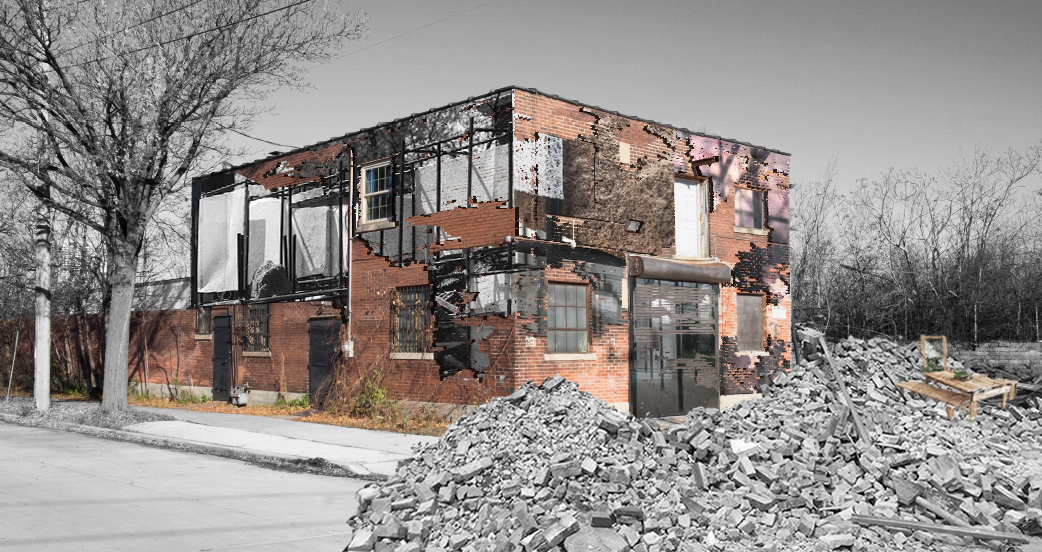
KILLING IT: The Life and Death of Great American Cities by Amanda Golemba, University of Wisconsin-Milwaukee, M.Arch ’20
Advisors: Nikole Bouchard, Jasmine Benyamin, and Erik Hancock / Independent Design Thesis
For decades, post-industrial cities throughout the United States have been quietly erased through self-imposed tabula rasa demolition. If considered at all, demolition is touted as the mechanism for removing unsightly blight, promoting safety, and discarding the obsolete and the unwanted. Once deemed unworthy, rarely does a building survive the threat of demolition.
In the last decade, the City of Chicago has erased over 13,000 buildings with 225 in just the last four months. Not only does this mass erasure eradicate the material and the spatial, but it permanently wipes the remnants of human bodies, values, and history — a complete annulment of event, time, and memory.
But why do we feel the need to erase in order to make progress?
Our current path has led to a built environment that is becoming more and more uniform and sterile. Much of America has become standardized, mixed-use developments; neighborhoods of cookie-cutter homes and the excessive use of synthetic, toxic building materials. A uniform world is a boring one that has little room for creativity, individuality, or authenticity.
This thesis, “KILLING IT,” is a design proposal for a traveling exhibition that seeks to change perceptions of the existing city fabric by visualizing patterns of erasure, questioning the resultant implications and effects of that erasure, and proposing an alternative fate. “KILLING IT” confronts the inherently violent aspects of architecture and explores that violence through the intentionally jarring, uncomfortable, and absurd analogy of murder. This analogy is a lens through which to trace the violent, intentional, and premature ending and sterilization of the existing built environment. After all, as Bernard Tschumi said, “To really appreciate architecture, you may even need to commit a murder.”1 But murder is not just about the events that take place within a building, it is also the material reality of the building itself.
Over the life of a building, scarring, moments in time, and decay layer to create an inhabitable palimpsest of memory. This traveling exhibition is infused with the palimpsest concept by investigating strategies of layering, modularity, flexibility, transparency, and building remains, while layering them together to form a system that operates as an inhabitable core model collage. Each individual exhibition simultaneously memorializes the violence that happened at that particular site and implements murderous adaptive reuse strategies through collage and salvage material to expose what could have been.
If we continue down our current path, we will only continue to make the same mistakes and achieve the same monotonous, sterilizing results we currently see in every American city and suburb. We need to embrace a new path that values authenticity, celebrates the scars and traces of the past, and carries memories into the future. By reimaging what death can mean and addressing cycles of violence, “KILLING IT” proposes an optimistic vision for the future of American cities.
- Tschumi, Bernard. “Questions of space: lectures on architecture” (ed. 1990)
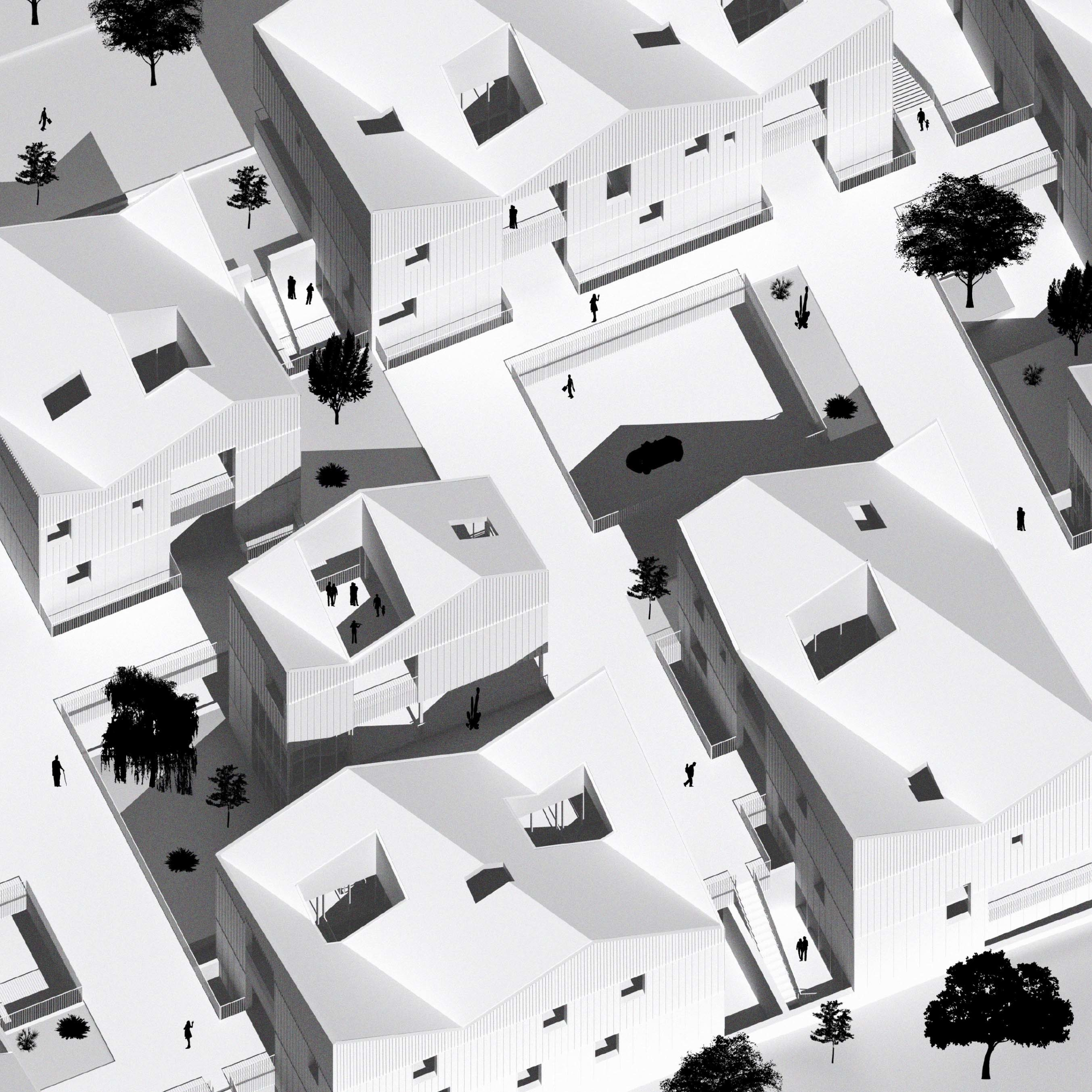
A New Prototype for Collective Housing by Juan Acosta and Gable Bostic, University of Texas at Austin, M.Arch ‘20
Advisor: Martin Haettasch / Course: Integrative Design Studio Read more: https://soa.utexas.edu/work/new-prototype-collective-housing
Austin is a city that faces extreme housing pressures. This problem is framed almost exclusively in terms of supply and demand, and the related question of affordability. For architects, however, a more productive question is: Will this new quantity produce a new quality of housing?
How do we live in the city, how do we create individual and collective identity through architecture, and what are the urban consequences? This studio investigates new urban housing types, smaller than an apartment block yet larger and denser than a detached house. Critically assessing existing typologies, we ask the question: How can the comforts of the individual house be reconfigured to form new types of residential urban fabric beyond the entropy of tract housing or the formulaic denominator of “mixed-use.” The nature of the integrative design studio allowed for the testing of material systems and construction techniques that have long had an important economic and ecological impact.
“A New Prototype for Collective Housing” addresses collectivity in both a formal and social sense, existing between the commercial and residential scales present in Austin’s St. John neighborhood as it straddles the I-35 corridor; a normative American condition. A diversity of programs, and multigenerational living, create an inherently diverse community. Additionally, a courtyard typology is used to negotiate the spectrum of private and shared space. Volumes, comprising multiple housing units ranging from studio apartments to four bedrooms, penetrate a commercial plinth that circulates both residents and mechanical systems. The use of heavy timber ensures an equitable use of resources while imbuing the project with a familiar material character.
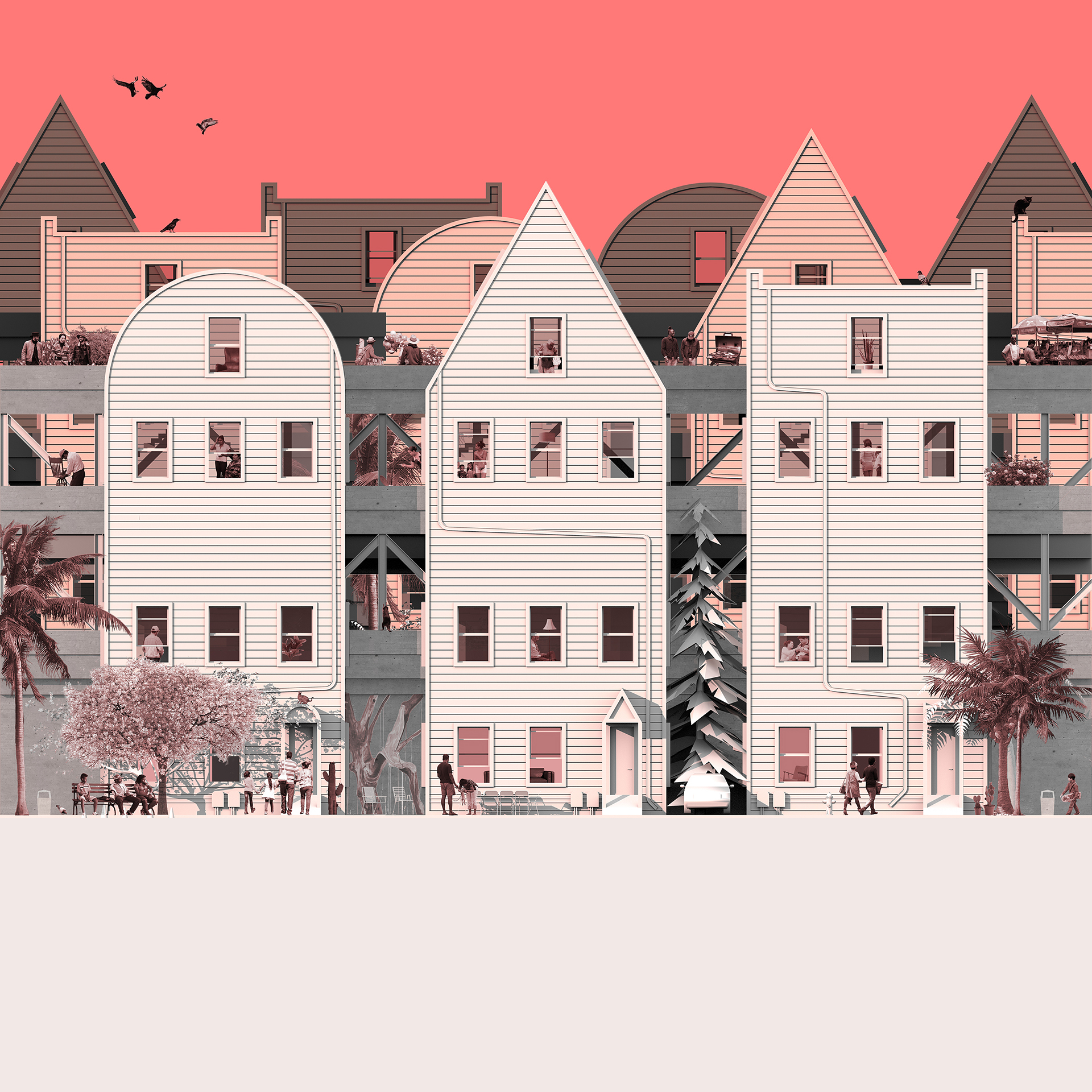
ELSEWHERE, OR ELSE WHERE? by Brenda (Bz) Zhang, University of California at Berkeley, M.Arch ’20
Advisors: Andrew Atwood and Neyran Turan See more: https://www.brendazhang.com/#/elsewhere-or-else-where/
“ELSEWHERE, OR ELSE WHERE?” is an architectural fever dream about the San Francisco Bay Area. Beginning with the premise that two common ideas of Place—Home and Elsewhere—are no longer useful, the project wonders how disciplinary tools of architecture can be used to shape new stories about where we are.
For our purposes, “Home,” although primarily used to describe a place of domestic habitation, is also referring generally to a “familiar or usual setting,” as in home-base, home-court, home-page, and even home-button. As a counterpoint, Elsewhere shifts our attention “in or to another place,” away. This thesis is situated both in the literal spaces of Elsewhere and Home (landfills, houses, wilderness, base camps, wastelands, hometowns) and in their culturally constructed space (value-embedded narratives determining whether something belongs, and to whom). Since we construct both narratives through principles of exclusion, Elsewhere is a lot closer to Home than we say. These hybrid spaces—domestic and industrial, urban and hinterland, natural and built—are investigated as found conditions of the Anthropocene and potential sites for new understandings of Place.
Ultimately, this thesis attempts to challenge conventional notions of what architects could do with our existing skill sets, just by shifting our attention—Elsewhere. The sites shown here and the concerns they represent undeniably exist, but because of the ways Western architecture draws thick boundaries between and around them, they resist architectural focus—to our detriment.
In reworking the physical and cultural constructions of Homes and Elsewheres, architects are uniquely positioned to go beyond diagnostics in visualizing and designing how, where, and why we build. While this project looks specifically at two particular stories we tell about where we are, the overall objective is to provoke new approaches to how we construct Place—both physically and culturally—within or without our discipline.
Share this entry
- Share on Facebook
- Share on Twitter
- Share by Mail
You might also like
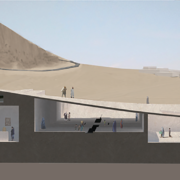
About Study Architecture

#Mission2.0 is here to disrupt the mundane. Are you? Join Now
- BIM Professional Course for Architects
- Master Computational Design Course
- BIM Professional Course For Civil Engineers
- Hire From Us

Request a callback

- Architecture & Construction
- Computational Design
- Company News
- Expert Talks
Architecture Thesis Projects: A Comprehensive List of 30 Topics to Pick From (Updated 2024)

Neha Sharma
13 min read
March 18, 2024
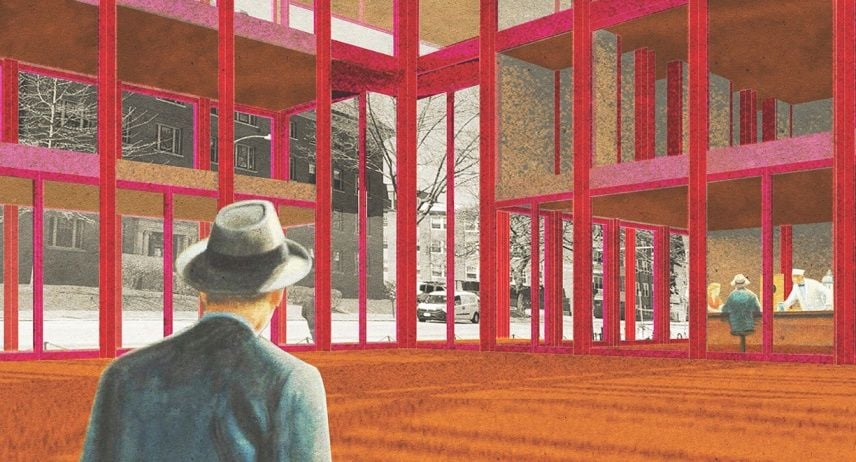
Table of Contents
Architecture Thesis: A culmination of all those years of intense training, sleepless nights, countless submissions and unforgettable memories. The grand finale!
It is a real test to showcase all the skills you’ve gained over the years in a single project. Naturally, choosing the right topic from an ocean of architecture thesis topics is one of the biggest challenges you can face as a final year student, as the topic itself may define the trajectory of your thesis!
To ease your conflicted mind, we have curated a comprehensive list of popular architecture thesis projects you might want to explore in your final year, along with links to relevant theses across the internet for your ready reference.
Go on, have a look! What sparks your interest?
Housing/ Residential Projects
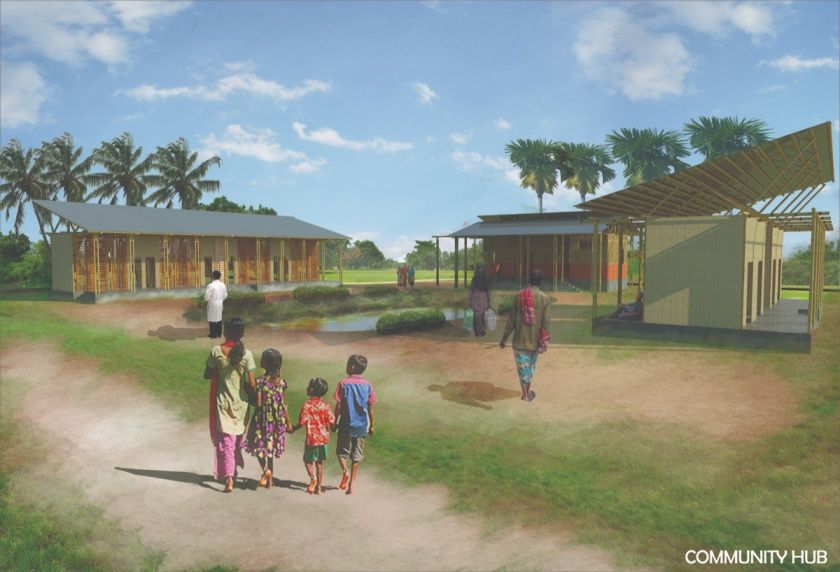
1. Affordable Housing
“Housing for all” is a major goal developing countries are striving to achieve. Not everyone has the resources to own a house or even rent one out. Conscious and well-planned housing design can turn cities into places where owning a house is not merely a dream. And architects can play a pivotal role in achieving this noble goal.
2. Gated Communities
With the city centres choking with pollution, traffic congestion and over-population, many people are now moving to the suburbs in closed, secure and private gated communities. These colonies circumference almost every major city now, with more emerging as you read. A gated community design could be an interesting (though slightly controversial) architecture thesis topic to explore residential neighbourhood planning.
3. Modular/ Disaster Relief/ Emergency Shelters
Land and resources are limited but the demand for them only keeps increasing giving rise to environmental hazards like deforestation, pollution and depletion of natural assets. In a rapidly changing, calamity-prone world, the design of modular, mobile, disaster relief shelters is the need of the hour!
4. Slum Redevelopment
Urban informality may be a fascinating, complex issue to tackle for your architecture thesis projects. Many people have varied opinions on the dense, informal urban developments popularly known as ‘slums’ , but few are willing to tackle the difficult issue from top to bottom (or bottom up!). Are you one of the few?
Institutional Projects
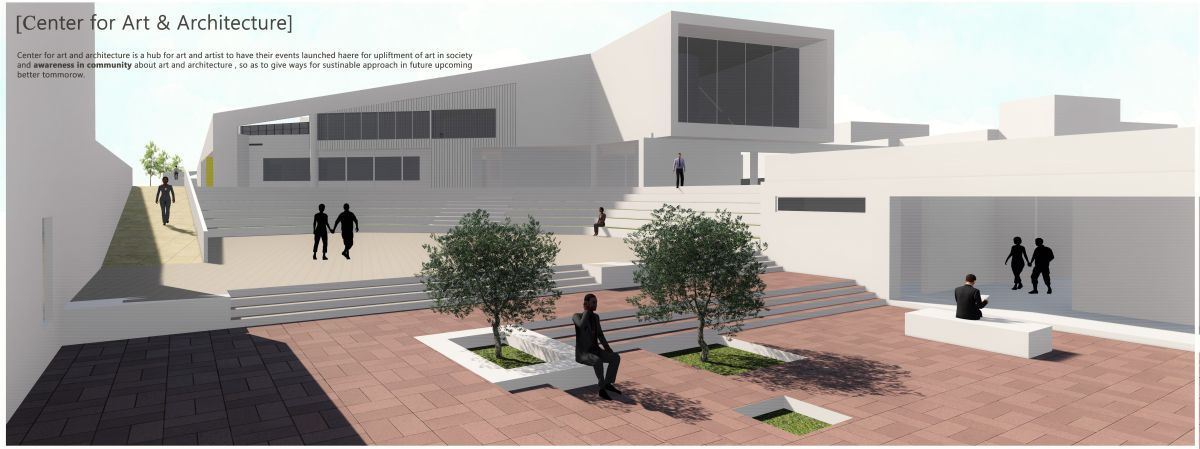
5. Educational and Skill-Training Institutions
Schools play an important role in shaping a person and are key in bringing up generations of bright individuals. Educational and skill-training institutions have vast options, ranging from kindergartens to higher-education institutes; schools of dance to special-needs institutes ! Ready to shape minds?
6. Rehabilitation and Wellness Institutions
A sound mind and sound body are key to a happy life!
Unfortunately, sometimes individuals have to be institutionalised to get their health back on track. Rehabilitation centres and centres for people with depression or trauma aim at people’s mental wellness, while public gyms and civic sports centres aim at people’s physical wellness. If healing architecture and landscape is something you like, this could be the best architecture thesis topic for you!
7. Research Institutions
Progress in science, technology and humanities improves our way of living and ensures our well-being. The Sheldon Coopers among us wouldn’t be happy to see any fewer research centres and laboratories than there are!
Public Infrastructure Projects
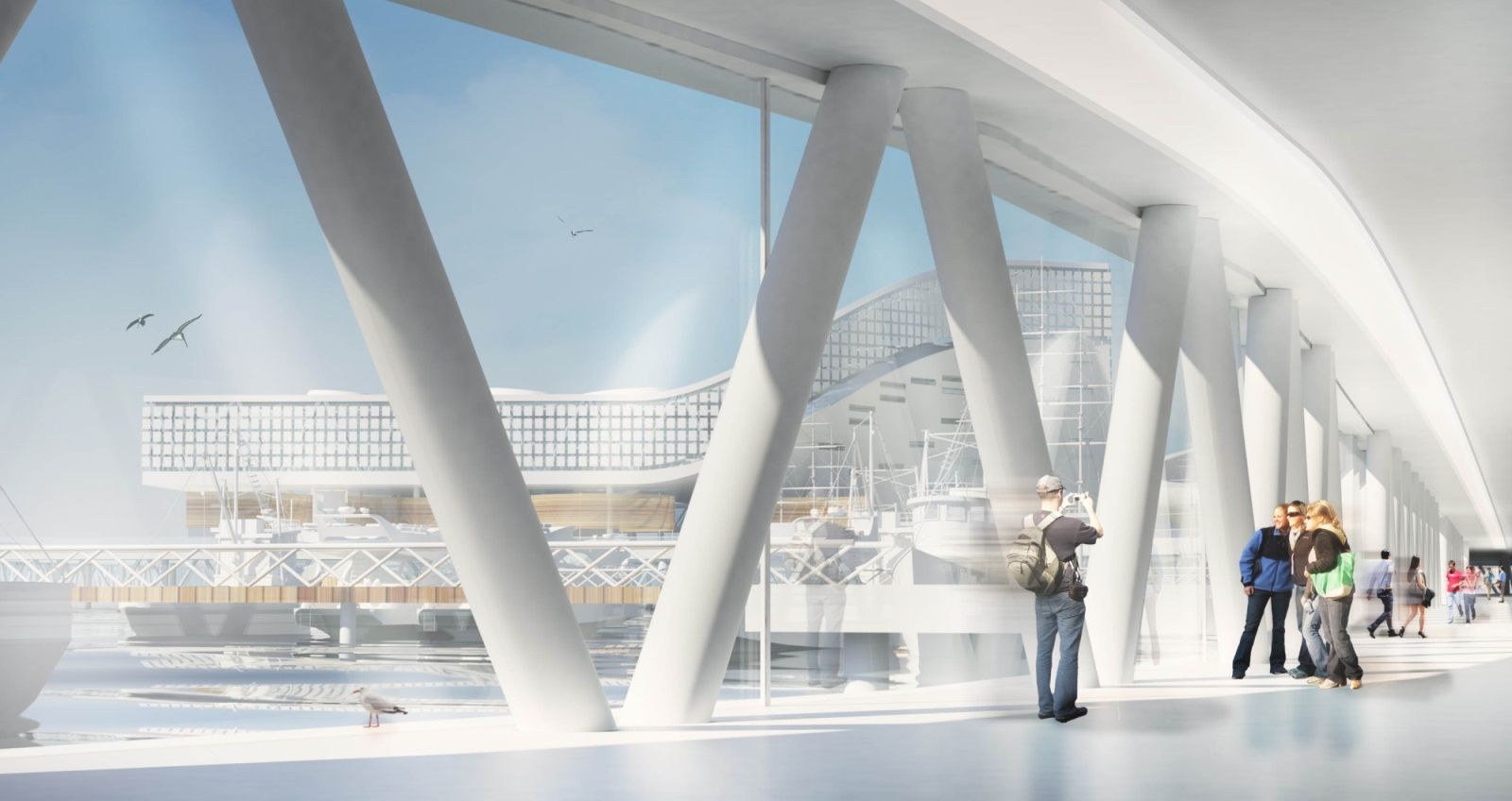
8. Hospitals
Healthcare services are undoubtedly the most important services any region needs. The pandemic has made us understand how under-equipped even the best hospitals can be and so there is an even bigger reason for every hospital, be it multi-speciality/ speciality , maternity, special needs, public or private , to be as well designed as possible. This, more than ever, is the need of the hour and can make for a pressing architecture thesis project.
9. Transit Hubs
Airports , Bus Terminals , Railway Stations , Inland Waterways, Seaports.
Do you love to travel? Have you ever waited for a train and imagined how much better that railway station could be? Then what are you waiting for? Be the change!
10. Sports Stadia
Remember that first stadium experience of watching a cricket or football match? The energy of the crowd, the adrenaline rush! Most group sports stadia ( Cricket , Football , Hockey, Baseball, etc) and sports cities require meticulous study before designing, making a very suitable architecture thesis project for students.
11. Urban/Street Redevelopment
How often do we walk the streets of our cities and almost die because a bike passed within inches of us? Street redevelopment projects catering to pedestrianisation are proven to improve the lives of millions and are rapidly gaining urgency in the urban design domain.
These projects often require extensive site study. Not sure what all to cover in your site analysis? Read - Site Analysis Categories You Need to Cover For Your Architecture Thesis Project .
12. Waterfront Development
Rivers are considered sacred and life-giving across the world. The pitiful conditions of water bodies today have led urban designers to take up River/Canal-front Development Projects which aim at minimising water pollution, a smooth transition from land to water, and ultimately encouraging visitors for leisure and fun activities.
13. Public Parks and Plazas
Parks are the lungs of the concrete jungles many of us live in. After a day of intense work, all we need is some greenery and fresh air; or to grab a beer at that corner cafe in the city square! The design of public parks, plazas and playgrounds could be the best architecture thesis topic for an urban/landscape enthusiast.
14. Social Infrastructure
A robust, well-functioning society accommodates and facilitates the wellness of all its citizens and living beings. Infrastructure like orphanages , nursing homes , animal shelters , night shelters , daycare centres, banks, prisons , juvenile schools, community development centres , and many more tend to those social needs of the society which cannot be overlooked. Inclined towards public welfare? Look no further!
Socio-Cultural Projects
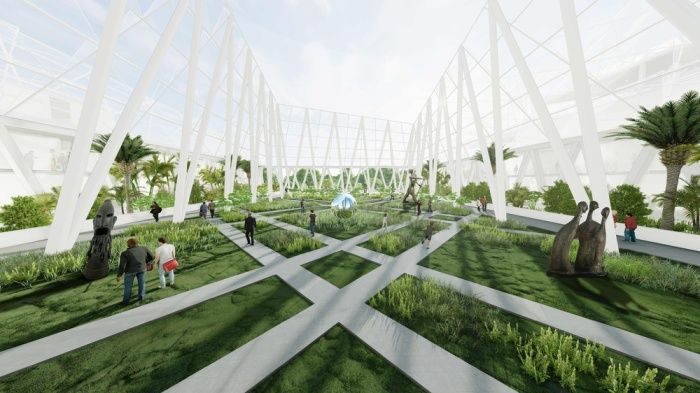
15. Community and Convention Centres
Humans are social animals. Now and then, we crave a meet-and-greet. Community and Convention Centres cater to this very need, and exploring the design angles for human interaction may be something worthy of your architecture thesis project. Be ready for competition though, this is one of the most popular architecture thesis topics students undertake!
16. Museums and Libraries
The culture-lovers among us would understand the value of a good museum or library and appreciate a well-designed one. Be it a museum of arts and crafts, culture, architecture , history or science, if the give and take of knowledge through some entertainment and delight (infotainment) is something you see yourself doing, then this could be the best architecture thesis topic for you.
17. Memorials
Memorials are the physical manifestations of the struggles endured, victories earned and life-changing events in history. They remind us to never forget the past, hoping for a better future at the same time, making memorial design both a fascinating yet weighted exercise.
18. Places of Worship/ Spiritual Centres
One cannot separate a human from their faith. Having a place to worship or connect with one’s spiritual self is as important to a human as going to school or a cinema hall. Places of worship like temples, churches, masjids, gurudwaras, monasteries , etcetera; and spiritual or meditation centres serve as places for gathering and become important landmarks in a settlement.
.png?width=767&height=168&name=MCD%20B%20(Course%20Banner).png)
Conservation and Heritage Projects
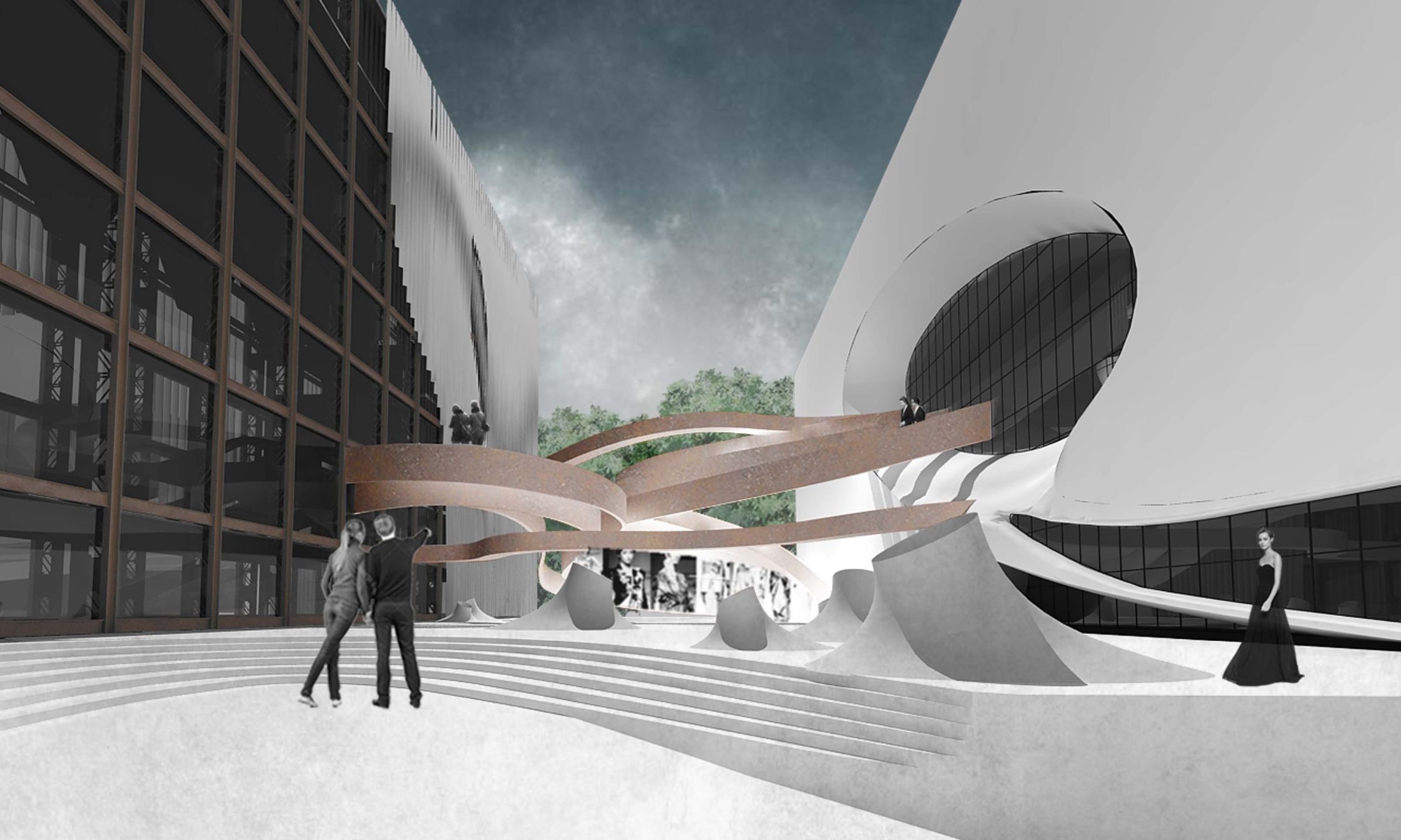
19. Conservation of Heritage Structures
Conservation of the priceless built heritage like palaces, monuments, places of worship, ancient settlements, etc has always been on the agenda of organisations like UNESCO and the Archeological Survey of India. If historical significance gets your heart rate up, hi history nerd! Help in conserving our heritage structures !
20. Adaptive Reuse of Heritage Buildings
History nerd, if you’re still here, here’s another architecture thesis topic for you. Some heritage can be conserved to attract tourists and some that are too out-of-order could be modified and reused for a different purpose, generating economy. Converting royal palaces into heritage hotels, a king’s court into an emergency ward for covid patients or factories into community spaces, adaptive reuse of the built form requires fine skill, respect for heritage, and an active imagination!
Offices/ Corporate Projects

21. Government Buildings
Workspaces for all government officials are mandatory for smooth administration. The scale of government buildings is diverse, from the Central Vista Redevelopment Project (*ahem*) to a district-sessions court. Some common categories are high courts, government-owned banks, secretariat and corporation buildings , income-tax offices, assembly and gathering centres , media offices and so on.
Sounds boring? Don’t be so sure. What originally sounds typical is where there is maximum potential to surprise your critics!
22. Corporate Office Towers
We all have seen or at least talked about the famous corporate jungles of our towns. They not only serve as important landmarks but help in increasing the economic value of a region (Very SEZ-y!). If you wanna tame the jungle, you could explore corporate office-building design for your architecture thesis topic.
23. Co-working and Remote-working Spaces
A popular trend before COVID was sharing workspaces, which now have the potential to be thought of as remote-working spaces! Rethinking the design of co-working spaces is very relevant to the times and has great scope for innovation.
With the times we live in, this could be the best architecture thesis topic!
Entertainment and Commercial Projects

24. Theatres and Auditoria
Who doesn’t like good showtime with family and friends? Theatres, auditoria and performance centres are the core of spaces showcasing and witnessing talent, and fall under another typology which has the potential to be reworked post-pandemic. The design of such entertainment stations can test the knowledge of large-span structures without losing a strong grip on creativity and functionality.
25. Multiplexes and Malls
Malls and multiplexes are very popular among the masses as they possess multiple brands of shopping, entertainment and food centres. Whether or not you agree with the mall typology, more keep coming up in growing towns every year. So why not study how they work and improve the concept for your architecture thesis project? The consumerist urbania will thank you!
26. Marketplaces
Shopping for groceries and essential commodities is a frequent need, and most people head to a single marketplace for all their essential goods shopping. A place with a high frequency of movement requires meticulous and thorough design, but can also be one of the most fun challenges to take up! Think farmer markets, community-owned produce markets, mandis, harbour fish markets, and flea markets, the possibilities are endless!
27. Mixed-Use Hubs
Taking your design challenge up a notch is by taking up a mixed-use hub . This is a high-density area that caters to more than one function and has mega economic value. It could be a combination of residential, commercial, institutional, or hospitality, commercial and public space, or much more. This concept is taken to another level by bringing transit hubs into the fray with transit-oriented development!
28. Film, Photo and Animation Studios
The use of digital media has increased multifold in the past couple of decades. A lot of creatives express themselves through digital content, increasing the need for more film , photo, animation and integrated studios . Since these functions can be highly specialised, there is a lot of potential to do impressive research for your architecture thesis project!
Hospitality and Tourism Projects
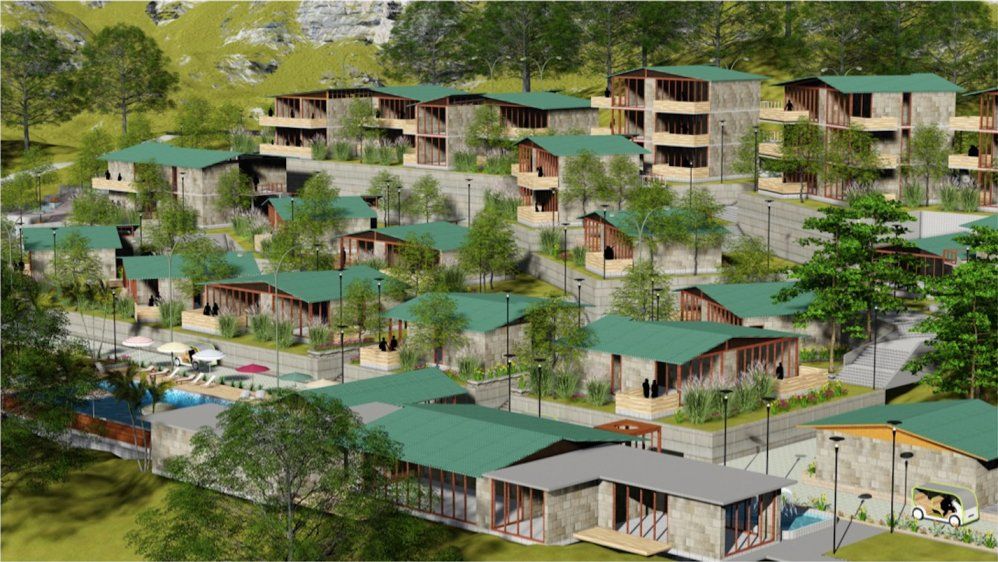
29. Eco-Tourism Resorts and Visiting Centres
Imagine spending a weekend at a secluded place, close to nature, with all the facilities you need to relax and just de-stress! Ecological resorts and tourist visiting centres aim to cause as little damage to the environment as possible. Keen on environmental sustainability, eco-tourism resorts should be encouraged in the tourism and hospitality industry and make for very relevant architecture thesis topics.
Landscape architecture enthusiasts, where are you all at?
30. Backpacker Lodging/ Youth Hostels
While the question of travel arises, not everyone can afford finely kempt hotels or resorts to lodge at. The youth may opt for backpacking trips to save money as well as to have an interesting experience! Backpacking/ youth hostels like Zostel and Nomads World are buzzing for their affordability, convenience and prospects of networking with like-minded people. If this is your jam, consider creating innovative spaces for it!
Futuristic/ Sci-fi/ Conceptual Projects
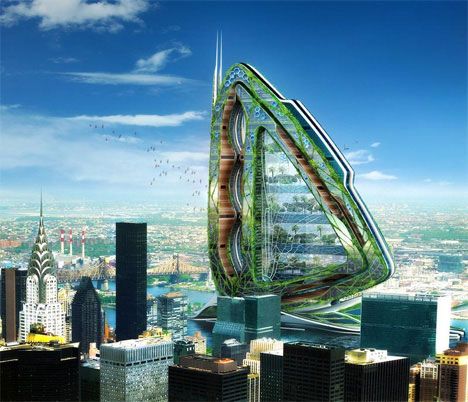
How about a settlement on Mars? Or a concert hall in the air? A transit hub of 2050? A forest within the city? Perhaps a residential colony on the water!
Such futuristic or conceptual architecture thesis topics are all the more enthralling as they might not have any precedents. They stretch a creative brain to its limit, and in the process may transform into a brilliant idea. Challenging conventions, thinking out of the box and taking up a futuristic architecture thesis project could be your achievement (both in design and in convincing the faculty) as a young designer!
Having read about some common architecture thesis topics, it is important to know that you must not be limited to the above list. Your architecture thesis is your own brainchild, and it does not need to conform or even fit within a category.
A great architecture thesis is also a key ingredient in creating a kickass architecture portfolio ! So give your all. Who knows, you may even end up receiving an award for your architecture thesis !
Hoping you found the inspiration you were looking for!
Need more guidance with your architecture thesis project? Head straight to our A-Z Architecture Thesis Guide !
.png?width=704&height=224&name=MCD%20B%20(Course%20Banner).png)
Learn how computational design can help your career
Speak with an expert now, related topics.
- design careers
- Architecture and Construction
- future tech
Related articles
.png)
Creative Jobs for Architects That Are Shaping the Future of the AECO Industry

Pragya Sharma
January 27, 2023

How BIM is Enhancing Landscape Architecture: A Comprehensive Guide
-1.png)
January 31, 2024
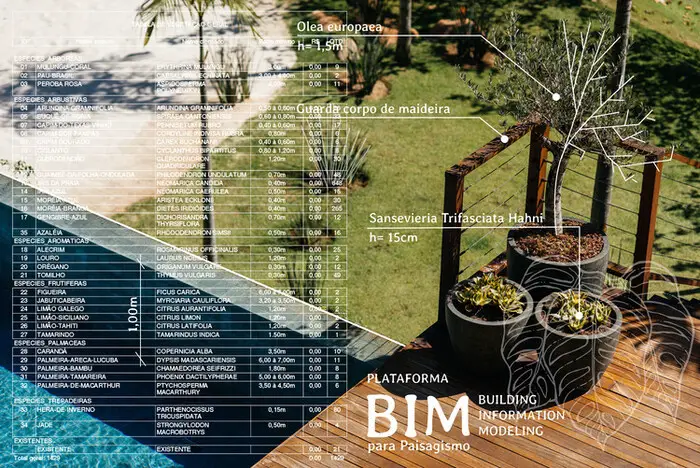
How to Best Use Revit for Landscape Architecture?: A Complete Guide
December 18, 2023
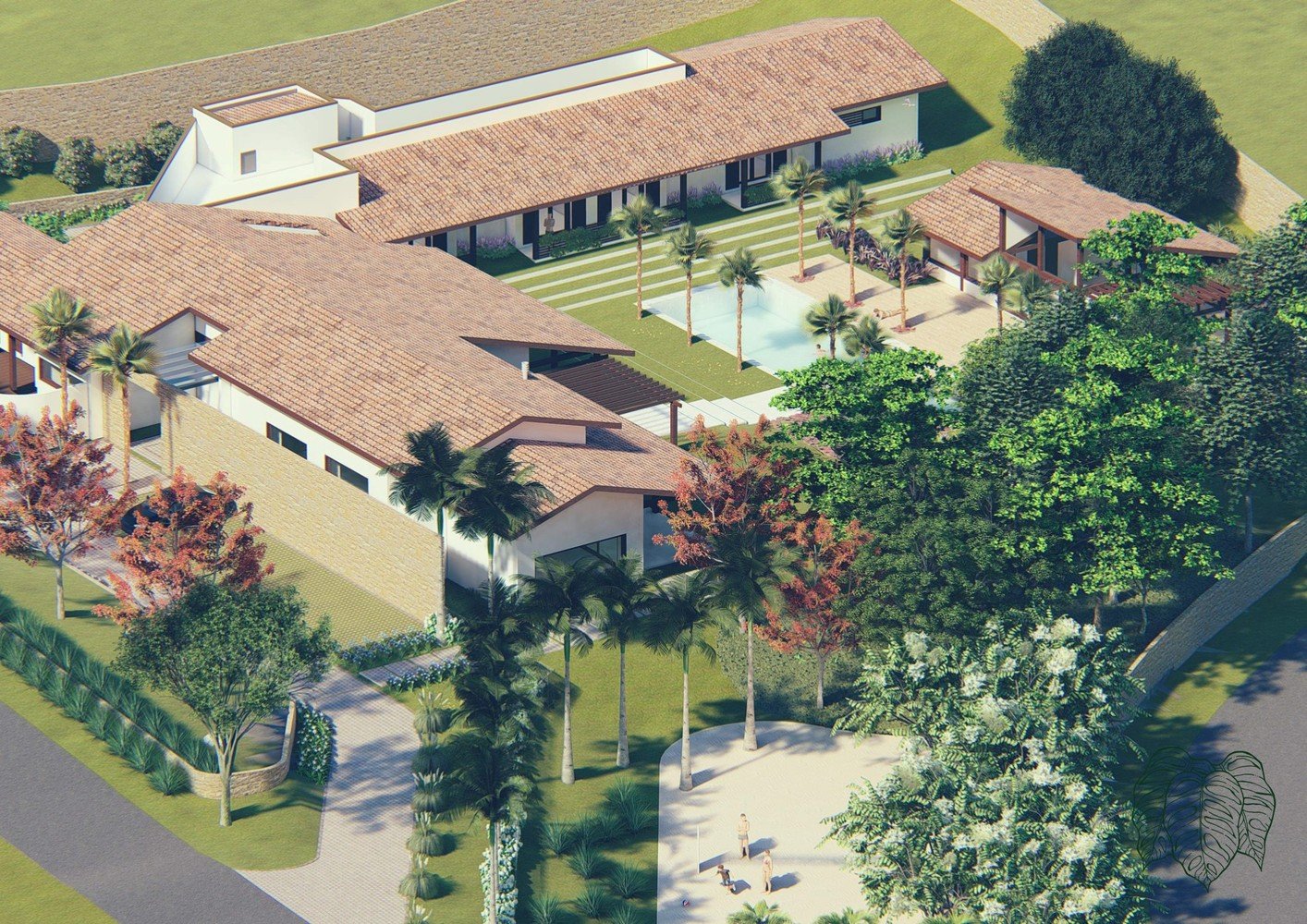
10 Famous Female Architects Leading the Way in the AEC Industry in the Modern Day
February 22, 2023

Ready to skyrocket your career?
Your next chapter in AEC begins with Novatr!
As you would have gathered, we are here to help you take the industry by storm with advanced, tech-first skills.

Dare to Disrupt.
Join thousands of people who organise work and life with Novatr.
Join our newsletter
We’ll send you a nice letter once per week. No spam.
- Become a Mentor
- Careers at Novatr
- Events & Webinars
- Privacy Policy
- Terms of Use
©2023 Novatr Network Pvt. Ltd.
All Rights Reserved
· Applications Now Open
SCI-Arc Breadcrumbs Home
SCI-Arc Breadcrumbs Academics
SCI-Arc Breadcrumbs Undergraduate Programs
SCI-Arc Breadcrumbs Bachelor of Architecture
SCI-Arc Breadcrumbs Bachelor of Architecture Thesis
Bachelor of Architecture Thesis
Undergraduate Thesis at SCI-Arc prepares students to articulate, propose, and defend their ideas and positions on architecture as well as engage with professionals as peers and colleagues.
Heading title
The culmination of SCI-Arc's five-year B.Arch curriculum is the year-long Undergraduate Thesis, which challenges the next generation of architects and designers to take firm positions, form fresh perspectives, and propose solutions for eminent architectural issues.
During their final year in the B.Arch program, students are required to take disciplinary stances in architecture, expressed through the development of a building design. This pedagogical model empowers students to move between speculative frameworks and the tangible considerations built architecture confronts.

“SCI-Arc provides immense exposure to multiple contemporary perspectives that challenge the way we approach architecture. Through technology and other disciplines, the school pushes students to seek alternative solutions to issues in the discourse. Given the current social, cultural, and political climate, SCI-Arc encourages its students to bring forward critical, repressed voices and allows the conversation to happen. Important and sensitive issues, like race, gender, sexuality, disability, and many more, can find their safe space here at SCI-Arc.
Throughout the five-year program, SCI-Arc shaped my view toward the architectural discourse. The inclusion of different aspects is as essential as the design itself. SCI-Arc gives me the hope that we can have a productive discussion about paramount issues in society through architecture.”

Undergraduate Thesis project by Santiago Alvarez + Malvin Bunata Wibowo. (B.Arch, '21)

Heading title Developing a Professional Position on Architecture
During SCI-Arc’s thesis prep semester, students build upon the knowledge and perspective acquired over the previous four years of liberal arts courses and elective seminars to develop an individual position in relation to contemporary architectural discourse.
Through engaging with research methods and architectural precedents students create drawings, images, and models that effectively illustrate their developing ideas.
In the final semester of the B.Arch program, students continue to hone their positions and define design challenges that address both their personal points of view as well as global issues relevant to the discipline and practice of architecture. Students then select sites and establish programs, ultimately conceiving schematic designs for structures that intellectually and tectonically resolve their initial design problems.
Thesis culminates with a presentation and public exhibition of a holistically-researched architectural thesis.

Heading title Critiqued by Remarkable Critics and Thinkers
Throughout their thesis year, B.Arch students regularly present their in-progress projects during reviews with the aim of fostering direction, discussion, and debate.
Each year, SCI-Arc invites world-renowned architects to serve as special advisors to Undergraduate Thesis students. Past Special Thesis Advisors have included Wolf D. Prix, Ferda Kolatan, and Neil M. Denari.

Undergraduate Thesis by Chu Wen Ong

“As a school of architecture, SCI-Arc placed me in an inclusive environment which nourished my own interests in the field by allowing me to pursue them while exposing me to contemporary figures in our profession and experiencing their different modes of engagement in the discourse of architecture.
One of my most valuable memories from SCI-Arc was walking along the long campus corridor, passing the different core and vertical studio spaces. Throughout the year, you can see the production grow into the hallway in a way that depicts the life of each semester and the culture of SCI-Arc.”

Undergraduate Thesis project by Takin Daneshmir + Yizhan Zhong. (B.Arch, '21)
Heading title Undergraduate Thesis Weekend
Undergraduate Thesis Weekend is a public platform where students launch their careers as architects during which over 70 jurors, critics, and architecture professionals from around the globe converge at SCI-Arc to discuss, debate, and dispute emerging questions in architecture. Leading the conversation about architecture’s current and evolving role, B.Arch thesis projects speculate on how theoretical and technological innovation will shape the future of the built environment.
Over the course of Thesis Weekend, B.Arch students present their final projects to panels of faculty and guest juries comprised of some of the top architects, critics, and theorists in the field. Past thesis critics have included Thom Mayne, Sir Peter Cook, Winka Dubbeldam, Graham Harman, Catherine Ingraham, Nanako Umemoto, and Hitoshi Abe.
Heading title Undergraduate Thesis Prize
SCI-Arc’s Undergraduate Thesis prize is endowed by Blythe Mayne and Pritzker Prize-winning architect and SCI-Arc founding faculty Thom Mayne to recognize an outstanding B.Arch thesis project that exemplifies the highest degree of design skill, technical expertise, and critical thinking. The recipient of the Blythe and Thom Mayne Undergraduate Thesis Prize is determined each year by jury commendations and announced during SCI-Arc’s commencement ceremony in September.

Isabela de Souza final presentation

Undergraduate Thesis by Peter Rosa.

Undergraduate Thesis by Ka Leung, Wilson Chan, Yi Peng Liu and Zixiao Kiwi Zhu (Advisor: Marcelo Spina)

Undergraduate Thesis axonometric drawing by Karim Saleh
- Hispanoamérica
- Work at ArchDaily
- Terms of Use
- Privacy Policy
- Cookie Policy
- Architecture Competitions
Architecture Thesis Of The Year | ATY 2022

- Published on July 06, 2022
ARCHITECTURE THESIS OF THE YEAR | ATY 2022
The most amazing Architecture Thesis of 2022!
After the overwhelming response from the first two editions, Charette is elated to announce the third edition of ‘Architecture Thesis of the Year Competition - ATY 2022’.
‘Architecture Thesis of the Year 2022’ is an international architecture thesis competition that aims to extend appreciation to the tireless effort and exceptional creativity of student theses in the field of Architecture. We seek to encourage young talent in bringing their path-breaking ideas to the forefront globally.
PREMISE Academic Design endeavours allow the free flow of unfettered ideas – experimental, bold, promising, and unconventional. An intensive architectural discourse and a collaborative design process are essential to developing ingenious solutions to complex problems of the future.
An Architecture Thesis is considered the avant-garde – pushing the boundaries of what is accepted as the norm in the architectural realm. It is the outcome of months of painstaking research and an excruciating design process yet it hardly gets any recognition beyond the design studio. It is imperative to share such revolutionary ideas with the entire fraternity to open up new possibilities for dialogue.
Competition Brief - https://thecharette.org/architecture-thesis-of-the-year/
AWARDS Exposure and recognition is the key to success for any designer. The ATY 2022 competition provides students with the opportunity to showcase their work on a global stage.
TROPHIES Custom Designed Trophies will be awarded & shipped to the Top 3 Winners.
CERTIFICATES Sharable and verifiable certificates of achievement will be awarded to the Winners, Honorable Mentions & Top 30.
INTERVIEW The Top 3 Winners will get an exclusive interview in both – written and video formats. Photos, interviews, and more information about the winners will be published on our website.
PUBLICATIONS The winning entries shall be published on Charette’s website & social media platforms and other international architecture websites partnered with us.
ELIGIBILITY ATY 2022 is open to architecture students of all nationalities and institutions. All Undergraduate/Bachelors and Graduate/Masters Thesis conducted in the calendar year 2017 – 2022 are eligible to participate. Group, as well as individual entries, are allowed.. The official language of the competition is English.
SUBMISSION GUIDELINES A total of 5 sheets of size 30 cm x 30 cm are to be submitted as a combined PDF document, which shall not exceed 5 MB.
Sheets 1 to 4: Graphic Representation Sheet 5: Text Summary
For more details visit - https://thecharette.org/architecture-thesis-of-the-year/
KEY DATES Advance Entry: 15 June - 15 July 2022 Early Entry: 16 July - 15 Aug 2022 Standard Entry: 16 Aug -15 Sep 2022 Last-Min Entry: 16 Sep -15 Oct 2022 Submission Deadline: 16 Oct 2022 Results: 15 Nov 2022
REGISTRATION FEE $25 - $55
Registration Deadline
Submission deadline.
This competition was submitted by an ArchDaily user. If you'd like to submit a competition, call for submissions or other architectural 'opportunity' please use our "Submit a Competition" form. The views expressed in announcements submitted by ArchDaily users do not necessarily reflect the views of ArchDaily.
- Sustainability
世界上最受欢迎的建筑网站现已推出你的母语版本!
想浏览archdaily中国吗, you've started following your first account, did you know.
You'll now receive updates based on what you follow! Personalize your stream and start following your favorite authors, offices and users.
- School of Arts & Sciences
- College of Arts & Sciences
- Graduate Division
- College of Liberal and Professional Studies
ARCH 4998: Honors Thesis
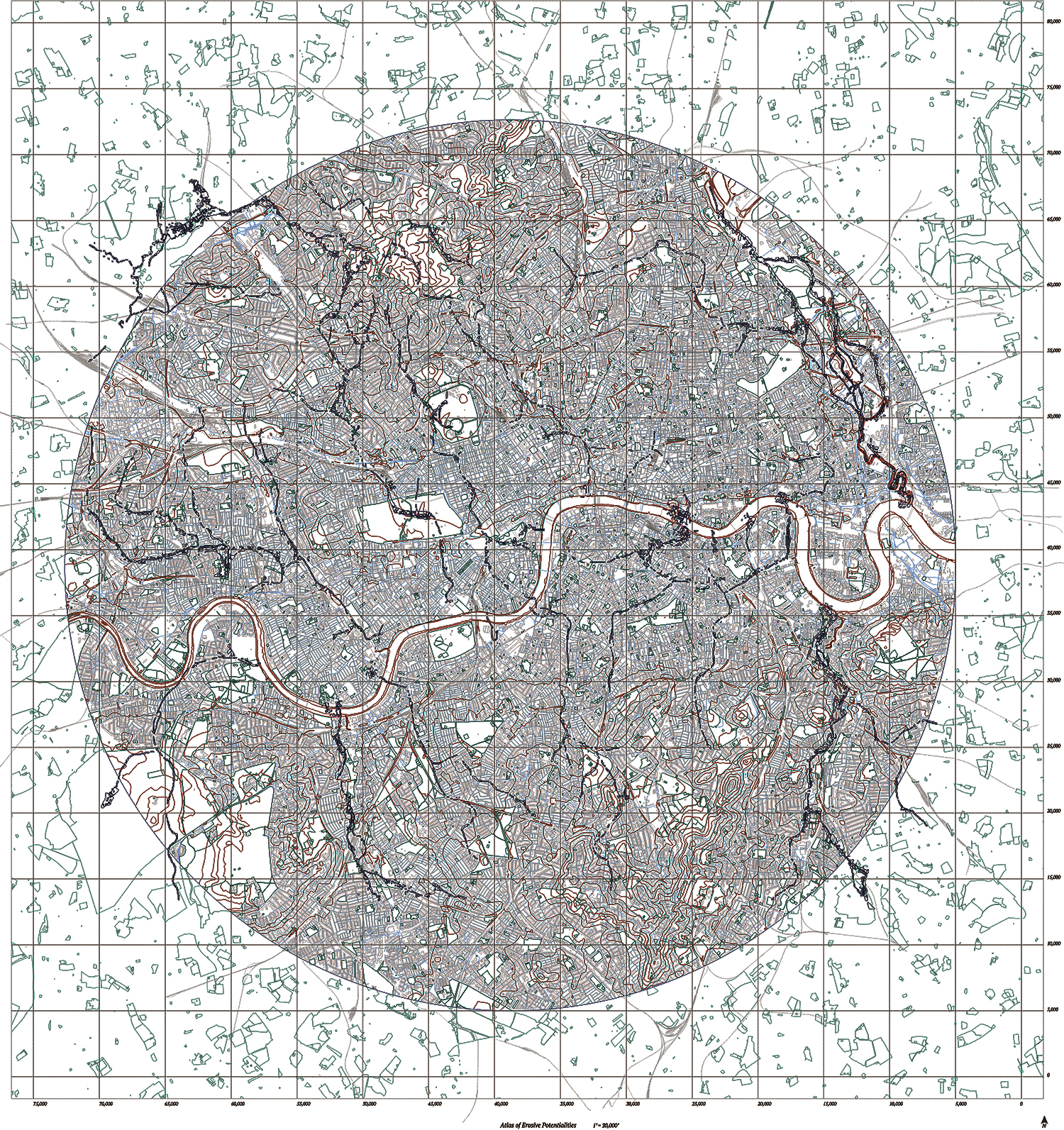
Atlas of Erosive Potentialities: Maria Diavolova
Thesis advisor: daniel barber, associate professor of architecture, 1: london as found: erosive potentialities in london's built environment (greater london, 2019) see more.
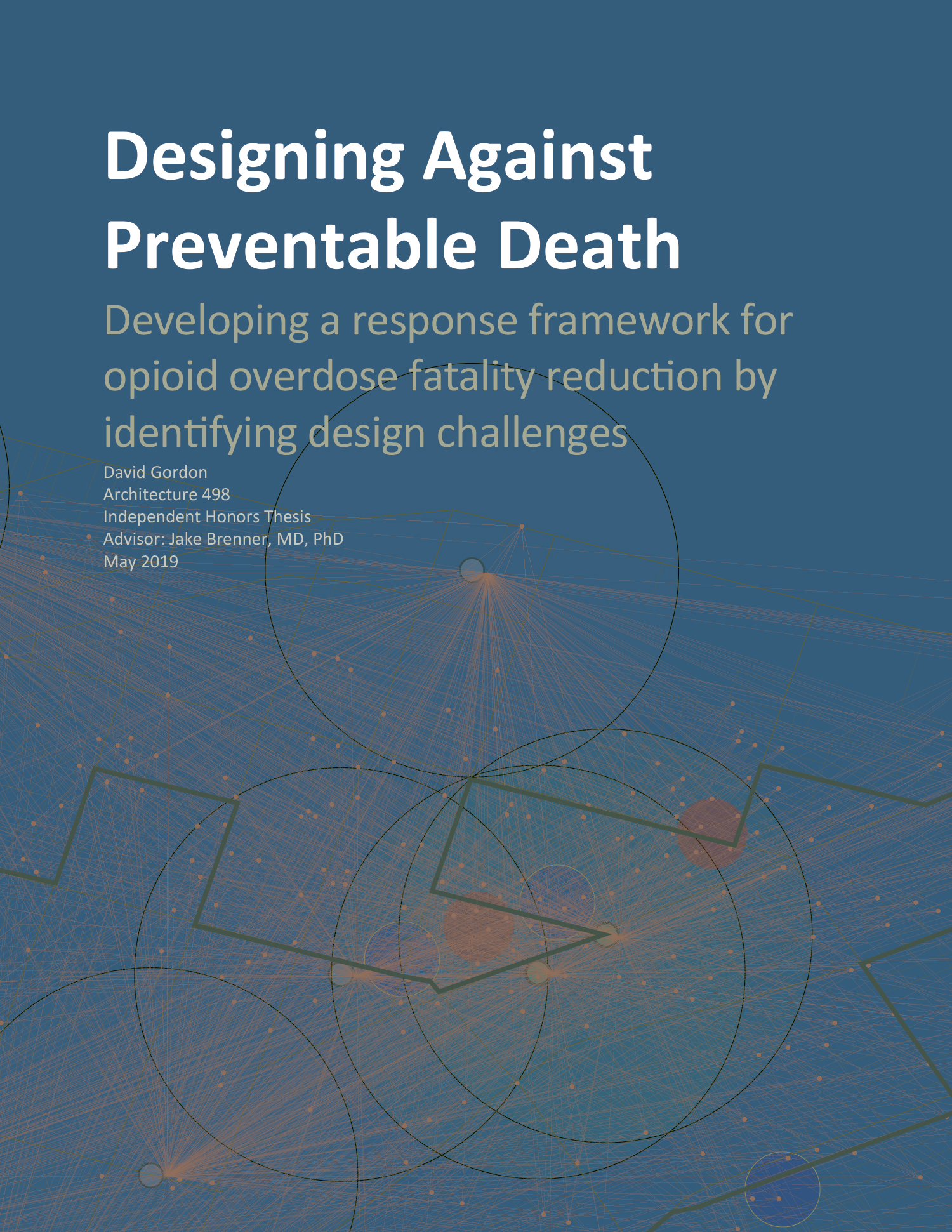

Designing Against Preventable Death: David Gordon
Thesis advisor: jacob brenner, assistant professor of medicine, 1: proposed paths for mobile units. see more.
Undergraduate Architecture Studies
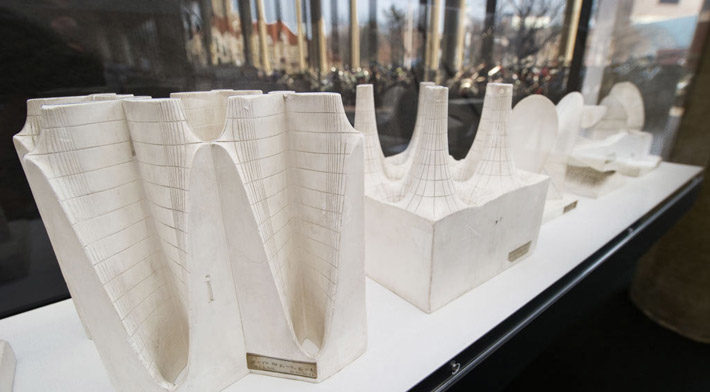
The study of architecture integrates technical and humanistic methods of inquiry with written and visual modes of representation, in traditional classroom venues and “making”-based studios designed especially for Harvard College undergraduate students within this track.
For students of Harvard College, Architecture Studies is a track within the Faculty of Arts and Sciences, History of Art and Architecture concentration , jointly administered by the History of Art and Architecture Department and the Graduate School of Design (GSD) . Linking the GSD and Harvard College, the track represents not only a first chance for undergraduates to tap into the Graduate School of Design’s course and event offerings, but also the enrichment that architecture and design thinking can offer to liberal-arts studies.
Architecture stands at the intersection of creative imagination, practical realization, and social use, comprising not only material structures of human occupation, but also the dynamic processes that shape human action and experience. The study of architecture integrates technical and humanistic methods of inquiry with written and visual modes of representation, in traditional classroom venues and “making”-based studios designed especially for Harvard College undergraduate students within this track.
You may find evolving examples of student design work and specifics on the making-based undergraduate courses that the track offers at this site as well: https://architecturestudies-undergrad.harvard.edu/home
Please see more details about the Architecture Studies track, including course requirements, at this link .
Theses and Dissertations
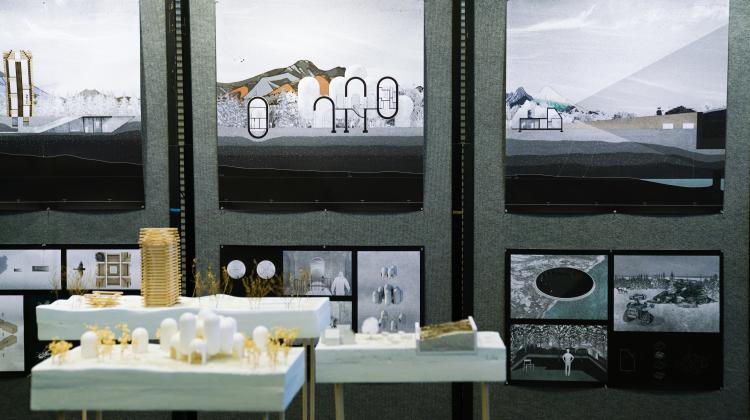
View all past theses and dissertations on DSpace@MIT .
Theses and Dissertations in HTC
Thesis and Dissertations in HTC
https://architecture.mit.edu/history-theory-criticism
Ask Yale Library
My Library Accounts
Find, Request, and Use
Help and Research Support
Visit and Study
Explore Collections
Architecture Research @ Yale: Dissertations & Theses
- How to Research Architecture
- Primary Sources
- Newspaper Articles
- Biographical Info
- Dissertations & Theses
- GIS Resources Training & Support
- Images, Plans, Drawings, Maps, AV
- Building Materials, Codes, Standards
- How to Cite Your Sources
- Copyright and Fair Use
WHAT EXPERT RESEARCHERS KNOW
A thesis is typically the culminating project for a master's degree, while a dissertation completes a doctoral degree and represents a scholar's main area of expertise. However, some undergraduate students write theses that are published online, so it is important to note which degree requirements the thesis meets. While these are not published works like peer-reviewed journal articles, they are typically subjected to a rigorous committee review process before they are considered complete. Additionally, they often provide a large number of citations that can point you to relevant sources.
Find Dissertations & Theses at Yale
Dissertations & Theses @ Yale University A searchable databases with dissertations and theses in all disciplines written by students at Yale from 1861 to the present.
Yale University Architecture Theses Included in Art, architecture, and art history theses and projects, Yale University (1915–2014)
Yale University Master of Fine Arts Theses in Graphic Design Finding aid for Arts Library Special Collections holdings of over 600 individual theses from 1951 to the present. The theses are most often in book format, though some have more experimental formats. Individual records for the theses are also available in the library catalog.
Yale University Master of Fine Arts Theses in Photography Finding aid for Arts Library Special Collections holdings of over 300 individual Master of Fine Arts theses from 1971 to the present. The theses are most often in the format of a portfolio of photographic prints, though some theses are also in book form. Individual records for the MFA theses are also available in the library catalog.
Find Dissertations & Theses Online
- << Previous: Biographical Info
- Next: GIS Resources Training & Support >>
- Last Updated: Jan 22, 2024 3:26 PM
- URL: https://guides.library.yale.edu/architecture
Site Navigation
P.O. BOX 208240 New Haven, CT 06250-8240 (203) 432-1775
Yale's Libraries
Bass Library
Beinecke Rare Book and Manuscript Library
Classics Library
Cushing/Whitney Medical Library
Divinity Library
East Asia Library
Gilmore Music Library
Haas Family Arts Library
Lewis Walpole Library
Lillian Goldman Law Library
Marx Science and Social Science Library
Sterling Memorial Library
Yale Center for British Art
SUBSCRIBE TO OUR NEWSLETTER
@YALELIBRARY

Yale Library Instagram
Accessibility Diversity, Equity, and Inclusion Giving Privacy and Data Use Contact Our Web Team
© 2022 Yale University Library • All Rights Reserved

20 Types of Architecture thesis topics

An architectural thesis is perhaps the most confusing for a student because of the range of typologies of buildings that exist. It also seems intimidating to pick your site program and do all the groundwork on your own. While choosing an architectural thesis topic, it is best to pick something that aligns with your passion and interest as well as one that is feasible. Out of the large range of options, here are 20 architectural thesis topics .
1. Slum Redevelopment (Urban architecture)
Slums are one of the rising problems in cities where overcrowding is pertinent. To account for this problem would be one of great value to the city as well as the inhabitants of the slum. It provides them with better sanitation and well-being and satisfies their needs.

2. Maggie Center (Healthcare architecture)
This particular typology of buildings was coined by a cancer patient, Margaret Keswick Jencks, who believed that cancer-treatment centres’ environment could largely improve their health and wellbeing by better design. This led a large number of starchitects to participate and build renowned maggie centres.

3. Urban Sprawl Redesign (Urban design)
The widening of city boundaries to accommodate migrants and overcrowding of cities is very common as of late. To design for the constant urban sprawl would make the city life more convenient and efficient for all its users.

4. Redesigning Spaces Under Elevated Roads and Metros (Urban infrastructure)
A lot of space tends to become dead space under metros or elevated roads. To use these spaces more efficiently and engage them with the public would make it an exciting thesis topic.

5. Urban Parks (Urban landscape)
Urban parks are not only green hubs for the city, which promotes the well-being of the city on a larger level, but they also act as great places for the congregation and bring a community together.

6. Reusing Abandoned Buildings (Adaptive reuse)
All buildings after a point become outdated and old but, what about the current old and abandoned buildings? The best way to respond to these is not by demolishing them; given the amount of effort it takes to do so, but to enhance them by restoring and changing the building to current times.

7. Farming in Cities (Green urban spaces)
With climate change and population on the rise, there is statistical proof that one needs to start providing farming in cities as there is not sufficient fertile land to provide for all. Therefore, this makes a great thesis topic for students to explore.

8. Jails (Civil architecture)
To humanize the function of jails, to make it a place of change and rehabilitation, and break from the stereotypical way of looking at jails. A space that will help society look at prisoners as more than monsters that harm, and as fellow humans that are there to change for everyone’s betterment.

9. Police Academies (Civil architecture)
Academies that train people to be authoritative and protective require spaces for training mentally and physically; focussing on the complexity of the academy and focussing on the user to enhance their experience would work in everyone’s favour.

10. High Court (Civil architecture)
Courtrooms are more often than not looked at as spaces that people fear, given the longevity of court cases. It can be a strenuous space; therefore, understanding the user groups’ state of mind and the problems faced can be solved using good design.

11. Disaster-resilient structures (Disaster-relief architecture)
Natural disasters are inevitable. Disaster-resilient structures are build suitably for the natural disasters of the region while also incorporating design into it, keeping in mind the climatic nature of the location.

12. Biophilic design (Nature-inspired architecture)
As humans, we have an innate love for nature, and the struggle between integrating nature and architecture is what biophilic design aims towards. To pick a topic where one would see minimal use of natural elements and incorporate biophilic design with it would be very beneficial.

13. Metro stations and Bus terminals (Transportation spaces)
Bus terminals and metro stations are highly functional spaces that often get crowded; and to account for the crowd and the problems that come with it, plus elevate the experience of waiting or moving, would contribute to making it a good thesis topic.

14. Airport design (Transportation spaces)
Airport designing is not very uncommon; however, it is a rather complex program to crack; thereby, choosing this topic provides you with the opportunity to make this space hassle-free and work out the most efficient way to make this conducive for all types of users.

15. Sports Complex (Community architecture)
If your passion lies in sports, this is a go-to option. Each sport is played differently, different materials are used, and the nature of the sport and its audience is rather complicated. However, to combine this and make it a cohesive environment for all kinds of users would make a good thesis topic.

16. Stadium (Community architecture)
Unlike a sports complex, one could also pick one sport and look at the finer details, create the setting, and experience for it; by designing it to curate a nice experience for the players, the public, and the management.

17. Waste-recycling center (Waste management)
Reducing waste is one of the most fundamental things we must do as humans. Spaces where recycling happens must be designed consciously. Just like any other space, it has been given importance over the years, and this would make a good thesis topic to provide the community with.

18. Crematorium (Public architecture)
Cremation of a loved one or anyone for that matter is always a rather painful process and a range of emotions is involved when it comes to this place. Keeping in mind the different types of people and emotions and making your thesis about this would mean to enhance this experience while still keeping the solemnity of it intact.

19. Museums (Community architecture)
Museums are spaces of learning, and the world has so much to offer that one could always come up with different typologies of museums and design according to the topic of one’s interest. Some of the examples would be cultural heritage, modern art, museum of senses, and many more.

20. Interpretation center (Community architecture)
An interpretation center is a type of museum located near a site of historical, cultural, or natural relevance that provides information about the place of interest through various mediums.

References:
- 2022. 68 Thesis topics in 5 minutes . [image] Available at: <https://www.youtube.com/watch?v=NczdOK7oe98&ab_channel=BlessedArch> [Accessed 1 March 2022].
- Bdcnetwork.com. 2022. Biophilic design: What is it? Why it matters? And how do we use it? | Building Design + Construction . [online] Available at: <https://www.bdcnetwork.com/blog/biophilic-design-what-it-why-it-matters-and-how-do-we-use-it> [Accessed 1 March 2022].
- RTF | Rethinking The Future. 2022. 20 Thesis topics related to Sustainable Architecture – RTF | Rethinking The Future . [online] Available at: <https://www.re-thinkingthefuture.com/rtf-fresh-perspectives/a1348-20-thesis-topics-related-to-sustainable-architecture/> [Accessed 1 March 2022].
- Wdassociation.org. 2022. A List Of Impressive Thesis Topic Ideas In Architecture . [online] Available at: <https://www.wdassociation.org/a-list-of-impressive-thesis-topic-ideas-in-architecture.aspx> [Accessed 1 March 2022].

Online Course – The Ultimate Architectural Thesis Guide
Apply Now – Online Course

Flora is a student of architecture, with a passion for psychology and philosophy. She loves merging her interests and drawing parallels to solve and understand design problems. As someone that values growth, she uses writing as a medium to share her learning and perspective.

5 Reasons why your design sheets fail to impress

Wangjing SOHO by Zaha Hadid Architects: Dancing Fans
Related posts.

The Syncretism between Ricardo Bofill and Gen Z

Architecture and Propaganda

An overview of Urban Morphology

Life of an Artist: Wangechi Mutu

What are the 7c’s of Communication that students must know before entrying the professional world

3D Printed Infrastructure: Bridges, Towers, and Beyond
- Architectural Community
- Architectural Facts
- RTF Architectural Reviews
- Architectural styles
- City and Architecture
- Fun & Architecture
- History of Architecture
- Design Studio Portfolios
- Designing for typologies
- RTF Design Inspiration
- Architecture News
- Career Advice
- Case Studies
- Construction & Materials
- Covid and Architecture
- Interior Design
- Know Your Architects
- Landscape Architecture
- Materials & Construction
- Product Design
- RTF Fresh Perspectives
- Sustainable Architecture
- Top Architects
- Travel and Architecture
- Rethinking The Future Awards 2022
- RTF Awards 2021 | Results
- GADA 2021 | Results
- RTF Awards 2020 | Results
- ACD Awards 2020 | Results
- GADA 2019 | Results
- ACD Awards 2018 | Results
- GADA 2018 | Results
- RTF Awards 2017 | Results
- RTF Sustainability Awards 2017 | Results
- RTF Sustainability Awards 2016 | Results
- RTF Sustainability Awards 2015 | Results
- RTF Awards 2014 | Results
- RTF Architectural Visualization Competition 2020 – Results
- Architectural Photography Competition 2020 – Results
- Designer’s Days of Quarantine Contest – Results
- Urban Sketching Competition May 2020 – Results
- RTF Essay Writing Competition April 2020 – Results
- Architectural Photography Competition 2019 – Finalists
- The Ultimate Thesis Guide
- Introduction to Landscape Architecture
- Perfect Guide to Architecting Your Career
- How to Design Architecture Portfolio
- How to Design Streets
- Introduction to Urban Design
- Introduction to Product Design
- Complete Guide to Dissertation Writing
- Introduction to Skyscraper Design
- Educational
- Hospitality
- Institutional
- Office Buildings
- Public Building
- Residential
- Sports & Recreation
- Temporary Structure
- Commercial Interior Design
- Corporate Interior Design
- Healthcare Interior Design
- Hospitality Interior Design
- Residential Interior Design
- Sustainability
- Transportation
- Urban Design
- Host your Course with RTF
- Architectural Writing Training Programme | WFH
- Editorial Internship | In-office
- Graphic Design Internship
- Research Internship | WFH
- Research Internship | New Delhi
- RTF | About RTF
- Submit Your Story
Looking for Job/ Internship?
Rtf will connect you with right design studios.

- Skip to main content
- assistive.skiplink.to.breadcrumbs
- assistive.skiplink.to.header.menu
- assistive.skiplink.to.action.menu
- assistive.skiplink.to.quick.search
- A t tachments (1)
- Page History
- Page Information
- Resolved comments
- View in Hierarchy
- View Source
- Export to PDF
- Export to Word
Undergraduate Program - Writing a Thesis
- Created by Marcus Mayo , last modified on Jan 31, 2024
Pursuing a Thesis
Senior Concentrators wishing to graduate with honors in the Department must produce a senior thesis and carry academic standing of Group II or better, with a minimum GPA of 3.00 in concentration grades. In deciding whether one wishes to fulfill the honors requirements, students should consider their academic interests, commitment to independent research, and other deadlines and obligations during the thesis year. Many students find the task of producing a substantial piece of critical scholarship interesting and rewarding, but others find the senior thesis can become a frustrating and unwieldy burden. Some students prefer the freedom to take elective courses or savor extra-curricular pursuits during their last year at the College unhampered by the encroaching demands of thesis preparation. In general, it may be remarked that students are unlikely to do well in the honors program who are not already proven practiced writers committed to the process of scholarship; the senior thesis is not the place to acquire basic skills in writing, design, and/or research. In considering the Department's honors requirements, it should be remembered that students with honors grades overall may graduate with University Honors (Cum Laude) even if they do not receive Honors in History of Art and Architecture.
Department Timeline of Thesis Preparation
A schedule of departmental dates and deadlines relative to the thesis will be available by the beginning of each Fall Term. The thesis writer and faculty thesis adviser should agree on a working schedule which will adequately conform to these deadlines.
Concentrators undertaking a thesis are required to enroll in HAA 99A (fall) and B (spring) for course credit. Students in the architecture track pursuing a design thesis should enroll in HAA 92r (fall) and 99B (spring). Joint concentrators will enroll in the 99 course of their primary concentration.
Overseen by the Senior Thesis Adviser, HAA 99A –“The Senior Thesis Seminar” – will meet several times during the fall semester for two-hour sessions devoted to facilitating the preparation and writing of a thesis. These sessions will cover such topics as compiling a bibliography, using archives, the use of key technology and software, and constructing and presenting an effective argument. All concentrators pursuing a written thesis project are required to enroll in this seminar. Joint concentrators enrolled in another department’s thesis seminar, and HAA design thesis students enrolled in HAA 92r, are welcome and encouraged to attend some or all sessions of 99A in addition to their primary thesis preparation course.
Late in the fall semester, each concentrator pursuing a thesis will deliver a twenty-minute presentation on the thesis topic, illustrated with digitally projected images, at the Senior Thesis Presentations. All departmental faculty and students will be invited to these presentations. By the end of winter break, each student will submit a complete first draft of the thesis, complete with illustrations.
Overview of Key Dates for Thesis Preparation
These dates apply to all HAA students wishing to pursue an honors thesis. For further criteria specific to students preparing a design thesis in the Architecture Track, see Academic Requirements: Design Thesis in the Architecture Track
Please consult the Senior Thesis Seminar Canvas site, or reach out to the Undergraduate Program Coordinator, for specific dates.
Spring Semester, Junior Year
- February: Initial Meeting. Junior concentrators are invited to meet with the Senior Thesis Adviser for an introduction to the senior thesis writing process.
- Early April: Short Proposals Due. Students submit a basic proposal outlining preliminary ideas, along with a list of potential faculty advisers. Faculty advisers are assigned to thesis projects in late April or early May.
- Late April: Applications due for Pulitzer and Abramson Travel Grants. See Undergraduate Prizes, Grants and Opportunities for details on grants and applications. Information on how to apply will be provided by the Undergraduate Program Coordinator. Grant recipients will be notified by email.
Fall Semester, Senior Year
- During the semester, students enroll in HAA 99A or 92r and follow course deadlines (Please consult the HAA 99A and 92r Canvas sites for additional details).
- Students meet regularly with their faculty advisers.
- Early December: Senior Thesis Presentations. All students pursuing a thesis will give a twenty-minute presentation to department students and faculty followed by discussion.
Spring Semester, Senior Year
- Late January: First Draft . Before the spring semester begins, students submit a full draft of the thesis, with illustrations, to the faculty adviser for comments.
- Late February/Early March: Second Draft. Students are encouraged to submit the near-final draft to their faculty adviser for a final review before formal submission to the Department.
- Week before Spring Break: Final Submission Deadline. Late submissions will not be accepted. On the afternoon of submission, all students are invited to attend the Thesis Reception.
- Late March: Gallery-Style public reception and presentation of Design Thesis projects. All architecture track students that have prepared a design thesis will present their work informally at this event. All HAA thesis writers, as well as faculty and graduate students, are encouraged to attend.
- April: Thesis Review and Honors Recommendation . Senior Honors Theses are read and critiqued by Members of the Faculty in HAA (and the GSD and the Harvard Art Museums, where relevant) at the request of the Senior Thesis Adviser. Department Faculty meet to vote on final honors recommendations, after which thesis writers will receive an email from the Senior Thesis Adviser notifying them of their thesis grade and recommendation for honors. Students should speak with their Allston Burr Senior Tutor for the anticipated final honors decision of the College.
- Mid-April: Senior Thesis Poster. All senior thesis writers are expected to prepare a digital file for a 24 x 36” poster summarizing the thesis to be exhibited in the HAA Department for the following academic year. A suggested template will be provided and a workshop will be held in late March for assistance with poster preparation. The printing and associated costs are taken care of by the Department. Examples of previous posters can be found here (AY21-22) and here (AY22-23) .
Senior Thesis Adviser
The process of taking honors and producing the thesis in the Department is overseen for all concentrators by the Senior Thesis Adviser, Professor Carrie Lambert-Beatty. The Senior Thesis Adviser leads the Fall Term thesis-writing seminar (HAA 99A) and directs the meetings for departmental approval once theses have been submitted.
Faculty Thesis Adviser
When submitting their initial proposal in the spring of the junior year, students should include a list of three possible faculty advisers. The Department will then match students with advisers according to student preference and faculty availability. Faculty thesis advisers should generally be full faculty members of the History of Art and Architecture Department, although Harvard museum curators with relevant expertise may also serve as advisers at the discretion of the Senior Thesis Adviser. Students in the architecture track pursuing a design thesis must also secure a second adviser from the faculty of the Graduate School of Design. Joint concentrators will generally select one faculty adviser from each department.
The adviser ought to serve as a critic of synthesized ideas and writings/designs, rather than as a director of the project. The adviser should be chosen with consideration more to compatibility in overseeing the process of the work than to being an expert in the field. If you have trouble identifying an appropriate adviser, please consult with the Senior Thesis Adviser or Undergraduate Program Coordinator before the spring deadline for the Thesis Proposal.
Graduate students in the Department of History of Art and Architecture do not advise Senior Theses.
Program Director, Harvard Undergraduate Architecture Studies Track
Megan Panzano, Program Director of the Harvard Undergraduate Architecture Studies Track, oversees the execution of the two studio courses “HAA 96A – Architecture Studio I: Transformations” and “HAA 96B – Architecture Studio II: Connections”, as well as the senior design-thesis seminar “HAA 92R – Design Speculations.” She is available to consult for general advice on the design-thesis process and in finding a suitable advisor from the GSD. She coordinates the assignment of readers to senior design-thesis projects in consultation with the Senior Thesis Adviser and Undergraduate Program Coordinator.
Undergraduate Program Coordinator
The Undergraduate Program Coordinator, Marcus Mayo, is available to consult at any point regarding general questions about the senior thesis writing process. In conjunction with the Senior Thesis Adviser, they will coordinate the initial meeting of concentrators interested in writing a thesis in the spring term of their junior year. The Undergraduate Program Coordinator collects and distributes thesis proposals, summer funding proposals, advisor assignments, as well as completed theses, grades and reader comments. They hold examples of the written requirements (thesis proposal and prospectus) and of the Pulitzer and Abramson Grant applications which students might wish to consult as paradigms.
Academic Requirements – Written Thesis
The writing and evaluation of the thesis is a year-long process, during which the writer enrolls in a senior thesis preparation seminar (HAA 99A) and meets at scheduled intervals with their faculty adviser to formulate, develop, and ultimately refine their thesis work.
The Department encourages seniors to think broadly and explore a problem of interest. The thesis topic does not necessarily have to be within the writer's declared major field, except when required for a joint concentration, in which case, the topic must address an issue shared by both concentrations. The thesis should demonstrate an ability to pose a meaningful question, present a well-reasoned and structured argument, and marshal appropriate evidence. The student should apply a clear methodology and be aware of the assumptions behind the argument, the possible deficiencies of the sources and data used, and the implications of the conclusions. The various parts of the thesis should cohere in an integrated argument; the thesis should not be a series of loosely connected short essays. A primary expectation of the thesis is that it is a work of independent scholarship, directed and crafted by the student, with the thesis adviser serving in a capacity of "indirect overseeing of the project."
There is no set pattern for an acceptable thesis. The writer should demonstrate familiarity with scholarly methods in the use of sources, but this should not be the sole criterion for evaluation. Of equal if not greater importance is the development of the central argument and the significance of the interpretation. A thesis may be research on a little-studied problem or a perceptive reassessment of a familiar question. A well-pondered and well-presented interpretive essay may be as good a thesis as a miniature doctoral dissertation.
Skill in exposition is a primary objective, and pristine editing is expected. The Department encourages writers to keep to a short page count, so as to craft a clear, concise paper, and further edit it to an exemplary presentation. In general, a History of Art and Architecture thesis will have a text ranging from 20,000 to 25,000 words. Students are encouraged to explore the resources available to thesis writers at the Harvard College Writing Center .
The writer must indicate the source of material drawn from others' work, whether quoted, paraphrased, or summarized. Students who, for whatever reason, submit work either not their own or without clear attribution to its sources will be subject to disciplinary action, up to and including requirement to withdraw from the College.
Academic Requirements: Design Thesis in the Architecture Track
The HAA Architecture Track asks students to select an Area of Emphasis for fulfillment of their degree -- either Design Studies or History and Theory. Students wishing to pursue an honors thesis in the History and Theory Area of Emphasis will usually complete a written senior thesis paper and presentation on the same model as the thesis for general concentrators (see Academic Requirements: Written Thesis ).
Students in the Design Studies Area of Emphasis who wish to pursue a thesis project may choose either a traditional thesis or a design thesis project. Design theses are creative thesis projects featuring a combination of written analysis and visual and physical design materials, as described below.
Course Requirements for Honors Consideration with a Design Thesis
Senior year – fall term.
- HAA 92r Design Speculations Seminar – required
- Course prerequisite: Completion of either HAA 96A (“Transformations”) or HAA 96B (“Connections”) studios.
- This course requires that students secure a pair of faculty advisers – one from Harvard History of Art and Architecture (HAA) Faculty and one from the Harvard GSD to support their research work within the course; course faculty advisers then serve as the faculty thesis advisers for the design thesis.
- Megan Panzano, GSD Architecture Studies Director, and Jennifer Roberts, HAA DUS, can both help make faculty adviser connections for students pursuing this path.
- (optional) HAA 99A Senior Thesis Tutorial – attendance in this seminar is encouraged but not required in parallel with HAA 92r.
- Presentation of design work to HAA and select GSD Faculty as part of HAA Thesis Colloquium in December) – required
Senior Year – Spring Term
- Throughout the semester: Advising meetings with individual faculty advisers to guide production and iterative refinement of design work (architectural analytical drawings and/or physical models), and edits to digital presentation made in fall term HAA Thesis Thesis Presentations.
- March 08, 2024, 12:00 pm EST: Submission of final senior thesis design project including digital images and written text as a single PDF file (see “ Submission Requirements for Honors Consideration ”).
- March 29, 2024 (date subject to change and TBC): Participation in a gallery-style final presentation with faculty and peers after submission of thesis . The design presentations for the gallery-style event should include an updated digital presentation comprised of the project title, author’s name, the most current versions of all elements listed below in the Final Project Requirements (with the exception of the Written Manifesto which should be consolidated to a single slide containing 3-4 sentences of a thesis statement capturing the topic of study, a position on this topic, your claim about design agency to address this topic, and specifically, what design elements you’ve explored in your thesis in this address). Students may elect to also print or plot selected original design drawings they produced (analytical or projective) from their digital presentation to pin up in the space. Likewise, students are encouraged to bring any sketch and/or final models they have created to display as well.
- April 8, 2024 : Preparation of a digital file for a 24 x 36” poster summarizing the thesis to be exhibited in the HAA department for the academic year to follow. A suggested template will be provided and a workshop will be held on March 26 (2024, date subject to change and TBC) for assistance with poster preparation. Examples of previous posters can be found here (AY21-22) and here (AY22-23) .
Submission Requirements for the Design Thesis Project (due March 08, 2024, 12:00 pm EST)
A single multi-page PDF file labeled with student’s full last name and first initial should be submitted. It should contain the following elements and should incorporate thesis research and design work from both fall and spring terms.
- Assemble a visual bibliography of references for your research project. The references included should be sorted into categories of your own authoring in relation to the research. Each reference should be appropriately cited using the Chicago Manual of Style, and each reference should also include an affiliated image. The bibliography should include a brief (approx. 200-word) annotation, describing the rationale behind the sorted categories.
- A written design manifesto of a minimum of 2,000 words that concisely articulates the issues, problems, and questions embedded in and engaged by your research project. The manifesto should address:
- Discourse : the role and significance of architecture relative to the project topic of interest, and;
- Context : the relationship of the project topic to broader surroundings which include but are not limited to the discipline of architecture, cultural contexts, technical developments, and/or typologies.
- The final statement should reflect deeply upon the character of the design process for the project, and discuss how the design process reinforced, inflected, or complicated the initial research questions. For most students, this final statement will be an elaboration upon the presentation text prepared for the fall senior thesis colloquium. The final text should capture and discuss the design elements that were further explored in the spring term as means to address initial research questions (i.e. include written descriptions of the drawings and/or physical models produced in relation to the thesis topic).
- A visual drawing or info-graphic that describes the process of design research undertaken for your topic. This should include the initial criteria developed for evaluating the project, the steps taken in examining the topic, the points in the process where it became necessary to stop and assess outputs and findings, and final adjustments to the methodology as the project neared completion.
- High resolution drawings, animations, and/or diagrams and photographs of physical models (if applicable) that were produced through research. These should be assembled in single-page layouts of slides to follow preceding elements listed here.
Grading of the Senior Thesis
Theses are read and critiqued by faculty members applying a higher standard than expected for work written in courses or tutorials. Faculty do make use of the full range of grades, and students should consider that any honors grade is a distinction of merit. If you have any questions, please contact the Senior Thesis Adviser, the Director of Undergraduate Studies, or the Undergraduate Program Coordinator.
SUMMA CUM LAUDE: A summa thesis is a work of "highest honor." It is a contribution to knowledge, though it need not be an important contribution. It reveals a promise of high intellectual attainments both in selection of problems and facts for consideration and in the manner in which conclusions are drawn from these facts. A summa thesis includes, potentially at least, the makings of a publishable article. The writer's use of sources and data is judicious. The thesis is well written and proofread. The arguments are concise and logically organized, and the allocation of space appropriate. A summa is not equivalent to just any A, but the sort given by instructors who reserve them for exceptional merit. A summa minus is a near miss at a summa and is also equivalent to an A of unusual quality.
MAGNA CUM LAUDE: A magna level thesis is a work worthy of "great honor." It clearly demonstrates the capacity for a high level of achievement, is carried through carefully, and represents substantial industry. A magna plus thesis achieves a similar level of quality to a summa in some respects, though it falls short in others; it is equivalent to the usual type of A. A magna thesis is equivalent to an A-. For a magna minus, the results achieved may not be quite a successful due to an unhappy choice of topic or approach; it is also equivalent to an A-.
CUM LAUDE: As is appropriate for a grade "with honors," a cum level thesis shows serious thought and effort in its general approach, if not in every detail. A cum plus is equivalent to a B+, a cum to a B, and a cum minus to a B-. The cum thesis does not merely represent the satisfactory completion of a task. It is, however, to be differentiated from the magna in the difficulty of the subject handled, the substantial nature of the project, and the success with which the subject is digested. Recall that, as students putting extraordinary effort into a thesis most frequently receive a magna, theses of a solid but not exceptional quality deserve a grade in the cum range. When expressed in numerical equivalents, the interval between a magna minus and a cum minus is double that between the other intervals on the grading scale.
NO DISTINCTION: Not all theses automatically deserve honors. Nevertheless, a grade of no distinction (C, D, or E) should be reserved only for those circumstances when the thesis is hastily constructed, a mere summary of existing material, or is poorly thought through. The high standards which are applied in critique of theses must clearly be violated for a thesis to merit a grade of no distinction.
Thesis Readers
Each thesis will have two readers chosen by the Department. All readers will be asked to submit written comments and grades, which will be factored equally to produce the final grade of the thesis. Individual grades are not released. When grades and comments are distributed, the readers no longer remain anonymous. There exists a procedure by which a writer may request, via the Senior Thesis Adviser, to speak with a reader provided that they are willing to discuss the work in further detail or expound on the written critique.
For joint concentrators, the department will defer the reading process to their primary concentration. Students should reach out to their adviser in their primary concentration for further information.
Grade Report and Honors Recommendation
At the end of each term, Fall and Spring, the student's progress in the Senior Tutorial (HAA 99) will be graded SAT or UNSAT. At the end of the Department's Honors Review process, the Senior Thesis Adviser calculates a recommendation for Honors based on the factored grades of the thesis and the student's grades in concentration coursework. This recommendation is presented to the Faculty at their meeting in April for review. A faculty vote is taken and this decision is passed as an honors recommendation to the Registrar of the College. For joint concentrators, the faculty will make recommendations to a student’s primary concentration but will defer the final grading process to them. The decision of Final Honors to be granted on the degree is made by the Registrar based on departmental recommendation and the student’s College-GPA. Students should consult with their Allston Burr Senior Tutor to determine what final honors might be anticipated at Commencement.
The needs of the Department for fair deliberation dictate that there may be no report of decisions regarding the thesis until after the Faculty has considered and voted upon each recommendation for honors. After honors recommendations have been voted by the Faculty, students will be notified of the Department's recommendation to the College and will receive an ungraded copy of each evaluation of their thesis. The comments in these evaluations should provide the student with a clear explanation of the strengths and weaknesses of the thesis, bearing in mind the difficulties of the field and the type of thesis submitted, and evaluating what was accomplished in terms of what was undertaken, given the student's limitation of time and experience.
Discontinuance of a Thesis
The process of writing the thesis is a serious commitment of time and energy for both the writer and the adviser. In some cases, however, it might be agreed that the thesis should be discontinued at mid-year. The Senior Tutorial year may be divided with credit through a procedure in which the student must submit a written paper presenting the project and research to that point.
Examples of Past Theses
Senior Honors Theses which are written by students who graduate Summa or Magna are deposited in the University Archives in Pusey Library . Copies of theses which are awarded the Hoopes Prize are held in Lamont Library . Students are urged to consult past theses as much can be gained in exploring precedent or seeking inspiration.
- Copyright © 2023 The President and Fellows of Harvard College
- Accessibility
- Privacy Policy
- Terms of Use
- Atlassian Confluence 7.19.17

Undergraduate Thesis
- Preparing for Thesis
- Elements of Thesis
List of References
- Images and Figures
- Library Home
How do you cite a youtube video? Books with 3 authors? Articles from an online database? Check out this Reference Examples PDF
Here are some of the guidelines for your reference page. Your references should include ALL resources that your cited in your thesis. In other words, if you used an in-text citation, I should be able to find the source in your list of references.
- Your works cited page should be titled References and begin on its own page.
- Need more information on where your reference is located in your thesis?
- After the first line of each reference all others should be indented a half inch, this is referred to as a "hanging indentation" and you can format it in Microsoft Word if you highlight the citation right click, and choose paragraph.
- List your citations in alphabetical order.
- List page numbers as ranges, first-last (17-23) rather than refer to all pages read.
- For online resources include URLs / DOIs. You do not need to say "retrieved from" or include the date the information was accessed.
- Capitalize each word in the titles of your sources except for articles such as the, an, with, etc. Only capitalize those articles that are at the beginning of a title such as The Wizard of OZ.
- Use italics for titles of works (e.g. books and films).
- List author names Last, First Initial. Middle Initial (should there be one), such as Campbell, L. G.
- If you cite more than one work by an author, list them alphabetically by title.
- Cite a work with no known author by its title.
- Items that are not text (for example YouTube videos and images) need a [media type] after the title. For instance a reference for a photo would have [photograph] after the title.
Reference Format Examples:

- << Previous: Citations
- Next: Images and Figures >>
- Last Updated: Sep 29, 2021 2:32 PM
- URL: https://library.newschoolarch.edu/ugthesis
Profs. Ron Daniel and Andrew Shaver "The Spiral Curriculum" Exhibition
April 10, 2024

This week, Profs. Ron Daniel and Andrew Shaver’s course “The Spiral Curriculum” exhibited an ongoing curricular project in the Cowgill Lobby. The course views students as valuable resources, promoting self-discovery and collaboration with faculty to nurture designers and improve design education. It also aims to provide foundational support for designers to keep evolving and contributing to our program’s collaborative culture by mentoring future students. Driven by these principles and the belief that the Foundation Design Program’s lab environment plays a crucial role in shaping professional designers, the showcased work aimed to emphasize the impact of design discussions on the education of young designers.
- Architecture
- College of Architecture, Arts, and Design
- School of Architecture
Office of Neuroscience Research
Thesis Defense: Ellie Wilson (Molecular Genetics and Genomics Program) – “Integrating DNA methylation and 3D-genome architecture to identify functional regulatory sequences in IDH mutant AML”
“Integrating DNA methylation and 3D-genome architecture to identify functional regulatory sequences in IDH mutant AML”
Thesis lab: David Spencer (WashU Medicine)
For inquiries contact Ellie at [email protected] .
Erickson, Schorr and Urban named NSF Grad Research Fellows
Ho, Redkar and Trevino also honored by the National Science Foundation
Brown School of Engineering graduate student Eva Erickson, senior Angelina Schorr and alumnus Joseph Urban ’21 have each been awarded a three-year fellowship in the National Science Foundation Graduate Research Fellowship Program (NSF GRFP). Additionally, Jason Ho ’22, and current graduate students Nikita Redkar and Avery Trevino were tabbed honorable mention candidates for the fellowship.
The NSF GRFP helps ensure the vitality of the human resource base of science and engineering in the United States and reinforces its diversity. The program recognizes and supports outstanding graduate students in NSF-supported STEM disciplines who are pursuing research-based masters and doctoral degrees at accredited United States institutions. NSF Fellows are anticipated to become knowledge experts who can contribute significantly to research, teaching, and innovations in science and engineering. These individuals are crucial to maintaining and advancing the nation’s technological infrastructure and national security as well as contributing to the economic well-being of society at large.

Erickson is a second-year doctoral student in Professor Kenny Breuer’s fluids and thermal sciences lab, where she has transitioned from biomechanics to bio-inspired robotics, conducting research on vortex induced vibrations of elastically mounted bluff bodies in unsteady vortex wakes. Specifically, she is looking at how seal whisker inspired geometries can suppress vortex induced vibrations to act as underwater sensors. Erickson earned her bachelor of science degree in physics from Georgia Tech in 2022, where she concentrated in Physics of Living Systems, studying centipede locomotion on complex terrains.

Schorr is completing a senior honors thesis in Howard M. Reisman ’76, P’09 Assistant Professor of Engineering Vikas Srivastava’s lab, evaluating cancer and healthy cell response to chemical stimuli in engineered tumor microenvironments. Previously, she was a researcher on a project that entailed increasing chemotherapeutic efficacy using pH-modulating and chemotherapeutic-releasing hydrogels, and co-authored a paper on this subject that was published in September 2023. Schorr was the recipient of Brown Engineering’s Neal B. Mitchell ’58 Systems Thinking Project Award, which helped fund the project over the summer of 2022. She then participated in the MIT Summer Research Program for the summer of 2023, working in the lab of Anders Sejr Hansen on a project related to genetic promoter characterization. After graduation, she will remain at Brown to begin her doctoral work with Assistant Professor Theresa Raimondo on RNA-lipid nanoparticles to modulate immunity.

Urban is currently working as a microfluidic systems engineer at Draper, where he has helped develop technologies used for multiplexed pathogen detection, microfluidic blood oxygenation, implantable device manufacturing, and CAR T-cell bioprocessing. While at Brown, he received his undergraduate degree in biomedical engineering with honors as a member of Professor Eric Darling’s lab. There, he investigated the use of hyper-compliant microparticles as drug delivery vehicles for long-term intravenous release, and was awarded the Domenico A. Ionata ’26 award for creativity in executing his thesis project. This fall, he will attend Boston University to obtain his Ph.D. in biomedical engineering, where he plans to pursue interdisciplinary research that applies systems biology principles and synthetic biology techniques to program the behavior of lab-grown tissues.

Ho, who received an honorable mention for the prestigious award, is currently in graduate school at the University of Texas at Austin. He is studying computer architecture, with a focus on neuromorphic (brain-inspired) machine learning hardware, examining the co-design of hybrid analog-digital neuromorphic (brain-like) computing systems that combine the energy efficiency of analog computing systems with the scalability of digital computing blocks. While at Brown, he did research with Associate Professor Jacob Rosenstein and Professor Sherief Reda.

Honorable mention awardee Redkar is a first year Ph.D. student in Yue Qi’s Materials Simulation for Clean Energy laboratory. Her undergraduate degree from UC Berkeley was in chemical engineering with chemistry and mathematics minors. At Brown, Redkar conducts research using computational methods to develop better battery technology with Professor Yue Qi.
Trevino, also named an honorable mention selection, is a second year Ph.D. student . He earned his bachelor’s degree in mechanical engineering, with an emphasis in applied math and physics, from UC Berkeley, and did undergraduate research at Lawrence Berkeley National Laboratory studying stochastic mesoscale systems and computational fluid dynamics. At Brown, he conducts research in biological flows, working with Professor Roberto Zenit and serves as a teaching assistant to several popular engineering undergraduate courses.
In all, 31 Brown students and alumni in science, technology, engineering and mathematics fields were chosen to receive tuition support and a stipend as promising young STEM leaders.

The Department of Art History
The Department of Art History offers B.A. and Ph.D. degrees in Art History and a wide range of courses in European, American, and Asian art history with additional strengths in architectural history and film and media studies.
Apr. 4, 2024
Prof. farshid emami publishes new book on isfahan architecture, “isfahan: architecture and urban experience in early modern iran”.

Assistant Professor Farshid Emami ’s new book Isfahan: Architecture and Urban Experience in Early Modern Iran (Penn State University Press) was recently released on April 2, 2024. “A vibrant urban settlement from medieval times and the royal seat of the Safavid dynasty, the city of Isfahan emerged as a great metropolis during the seventeenth century. Using key sources, this book reconstructs the spaces and senses of this dynamic city. Focusing on nuances of urban experience, Farshid Emami expands our understanding of Isfahan in a global context. He takes the reader on an evocative journey through the city’s markets, promenades, and coffeehouses, bringing to life the social landscapes that animated the lives of urban dwellers and shaped their perceptions of themselves and the world. In doing so, Emami reveals seventeenth-century Isfahan as more than a cluster of beautiful monuments and gardens. It was a cosmopolitan city, where senses and materials, nature and artifice, and ritual and sociability acted in unison, engendering urban experiences that became paramount across the globe during the early modern period. Drawing extensively on Persian literary and visual sources, including the “Guide for Strolling in Isfahan,” this book casts new light on the history of a major Eurasian city and opens up new possibilities for cross-cultural studies of urban experience in the early modern period.”
For those wanting to learn more from Prof. Emami, he will be teaching both D1 courses “ HART 101: Intro. to the History of Art I ” and “ HART 221: Cities, Mosques, Palaces: Intro. to Islamic Art & Architecture ” in the fall.

IMAGES
VIDEO
COMMENTS
Theses from 2021. PDF. Collage, Perspective, and Space: The Consequences of the Method of Mies van der Rohe, Daniel Barker. PDF. Hurricanes and Housing: Highlighting the Ongoing Impact of Hurricane Michael and the Post-Disaster Housing Problem, Mary Beth Barr. PDF. Dance in Public Space, Rachel Cruzan.
KILLING IT: The Life and Death of Great American Cities by Amanda Golemba, University of Wisconsin-Milwaukee, M.Arch '20. Advisors: Nikole Bouchard, Jasmine Benyamin, and Erik Hancock / Independent Design Thesis. For decades, post-industrial cities throughout the United States have been quietly erased through self-imposed tabula rasa demolition. If considered at all, demolition is touted as ...
Make it easy by checking out this list of 30 architecture thesis projects with examples. Choosing an architecture thesis topic can be quite challenging. Make it easy by checking out this list of 30 architecture thesis projects with examples. ... Undergraduate Thesis by Yi Peng Liu, Ka Leung, Wilson Chan and Zixiao Kiwi Zhu at SCI-Arc (Source ...
With so many factors to consider and deadlines closing in, students easily end up making decisions that they regret later. Here are eight tips to help you make an informed choice on the matter: 1 ...
Bachelor of Architecture Thesis. Undergraduate Thesis at SCI-Arc prepares students to articulate, propose, and defend their ideas and positions on architecture as well as engage with professionals as peers and colleagues. The culmination of SCI-Arc's five-year B.Arch curriculum is the year-long Undergraduate Thesis, which challenges the next ...
Tulane University. Institution: Tulane University School: Tulane School of Architecture Course: ARCH 5990/6990 - Thesis Studio Tutors: Iñaki Alday, Liz Camuti, Ammar Eloueini, Margarita Jover ...
choose a topic that will enable you to read and understand the literature. ensure that the topic is manageable and that material is available. make a list of keywords. be flexible. define your topic as a focused research question. research and read more about your topic. use your question to formulate a thesis statement.
ATY 2022 is open to architecture students of all nationalities and institutions. All Undergraduate/Bachelors and Graduate/Masters Thesis conducted in the calendar year 2017 - 2022 are eligible ...
What is Thesis? The Undergraduate Thesis Research Studio offers a unique opportunity to continue your design education at NewSchool. You will plan, develop, and execute a self-generated self-directed architectural research project. You will identify a problem based on your personal interests and propose an architectural solution by navigating and expanding on a given methodology comprised of ...
Undergraduate Thesis. Description. Program of thesis research leading to the writing of an SB thesis. Intended for seniors. Twelve units recommended. Subject Number. 4.THU. ... School of Architecture + Planning 77 Massachusetts Avenue, Cambridge, MA, USA. Footer. Imprint; Accessibility;
Students accepting an RA position with their thesis advisor doing research directly related to their thesis should register for 3 units of: 4.THG — if an approved thesis proposal has been submitted. 4.189, 4.288, 4.388, 4.488, 4.489, 4.589 or 4.689 if an approved thesis proposal has not yet been submitted. 8/9/22.
The five-year Bachelor of Architecture (BArch) and the graduate Master of Architecture (MArch) prepare students with advanced skills in the areas of history, theory, representation and technology. ... Undergraduate Thesis, 2021. Luke Escobar. Graduate Thesis, 2022. Valentina Mancera and Natalie Rendleman. Undergraduate Thesis, 2022. Zach ...
Thesis Advisor: Daniel Barber, Associate Professor of Architecture 1: London as Found: Erosive Potentialities in London's Built Environment (Greater London, ... Undergraduate Architecture Charles Addams Hall, Rm 213 University of Pennsylvania 200 S. 36th Street Philadelphia, PA 19104-6221. Phone: 215-746-1401.
The study of architecture integrates technical and humanistic methods of inquiry with written and visual modes of representation, in traditional classroom venues and "making"-based studios designed especially for Harvard College undergraduate students within this track. You may find evolving examples of student design workand specifics on ...
MIT Massachusetts Institute of Technology School of Architecture + Planning 77 Massachusetts Avenue, Cambridge, MA, USA
A thesis is typically the culminating project for a master's degree, while a dissertation completes a doctoral degree and represents a scholar's main area of expertise. However, some undergraduate students write theses that are published online, so it is important to note which degree requirements the thesis meets.
While choosing an architectural thesis topic, it is best to pick something that aligns with your passion and interest as well as one that is feasible. Out of the large range of options, here are 20 architectural thesis topics. 1. Slum Redevelopment (Urban architecture) Slums are one of the rising problems in cities where overcrowding is pertinent.
ARCHITECTURE-Final Thesis. Diego Crisóstomo García. 299 7.5k. Urban planning Portfolio / 2022. Mariia Polyakova. 342 16.2k. Behance is the world's largest creative network for showcasing and discovering creative work.
The Grid. The grid is your underlying structure which helps create visual hierarchy by sizing and positioning images and text to create a coherent design. The grid is the graphic expression of a set of assumptions about the permissible sizes and shapes of images and blocks of text. It enables you to achieve and sustain design consistency.
VAARI - A CITY CULTURAL CENTER REINTERPRETING THE CONCEPT OF PILGRIMAGE THROUGH ARCHITECTURE STORY OF MY THESIS 1. PILGRIMAGES IN INDIA. 2. THE 800 YEAR OLD VARKARI OF MAHARASHTRA.. The practice ...
The thesis writer and faculty thesis adviser should agree on a working schedule which will adequately conform to these deadlines. Concentrators undertaking a thesis are required to enroll in HAA 99A (fall) and B (spring) for course credit. Students in the architecture track pursuing a design thesis should enroll in HAA 92r (fall) and 99B ...
Undergraduate Architectural Thesis'18 "POST POST RETIREMENT LIVING LIVING" A thesis submitted in partial fulfillment of the academic requirement of Graduation in Architecture. ARCHITECTURE
Oct 13, 2015 - Undergraduate Thesis - Inhabiting Porosity by Allie Jarett. Oct 13, 2015 - Undergraduate Thesis - Inhabiting Porosity by Allie Jarett. Pinterest. Today. Watch. Shop. Explore. Log in. Sign up. ... A porous architecture creates a network of sensory appeal. Labyrinth. Program - Fashion retail, supports a porous building with the ...
references. References. Here are some of the guidelines for your reference page. Your references should include ALL resources that your cited in your thesis. In other words, if you used an in-text citation, I should be able to find the source in your list of references. Your works cited page should be titled References and begin on its own page.
Undergraduate Architecture Undergraduate Architecture Submenu Toggle. Bachelor of Architecture; Graduate Architecture Graduate Architecture Submenu Toggle. Degrees; Faculty, Staff, & Advisory Board. ... Thesis Student Clayton Greer Openlab: Boston Program Exhibition 2024 W_Internship ...
Undergraduate Opportunities; About the ONR About ... Ellie Wilson (Molecular Genetics and Genomics Program) - "Integrating DNA methylation and 3D-genome architecture to identify functional regulatory sequences in IDH mutant AML" April 17, 2024. 10:00 am - 11:00 am. Thesis Defenses, Upcoming. Zoom/Moore Auditorium (Medical Campus, North ...
Schorr is completing a senior honors thesis in Howard M. Reisman '76, P'09 Assistant Professor of Engineering Vikas Srivastava's lab, evaluating cancer and healthy cell response to chemical stimuli in engineered tumor microenvironments. ... He is studying computer architecture, with a focus on neuromorphic (brain-inspired) machine ...
Assistant Professor Farshid Emami's new book Isfahan: Architecture and Urban Experience in Early Modern Iran (Penn State University Press) was recently released on April 2, 2024. "A vibrant urban settlement from medieval times and the royal seat of the Safavid dynasty, the city of Isfahan emerged as a great metropolis during the seventeenth century.